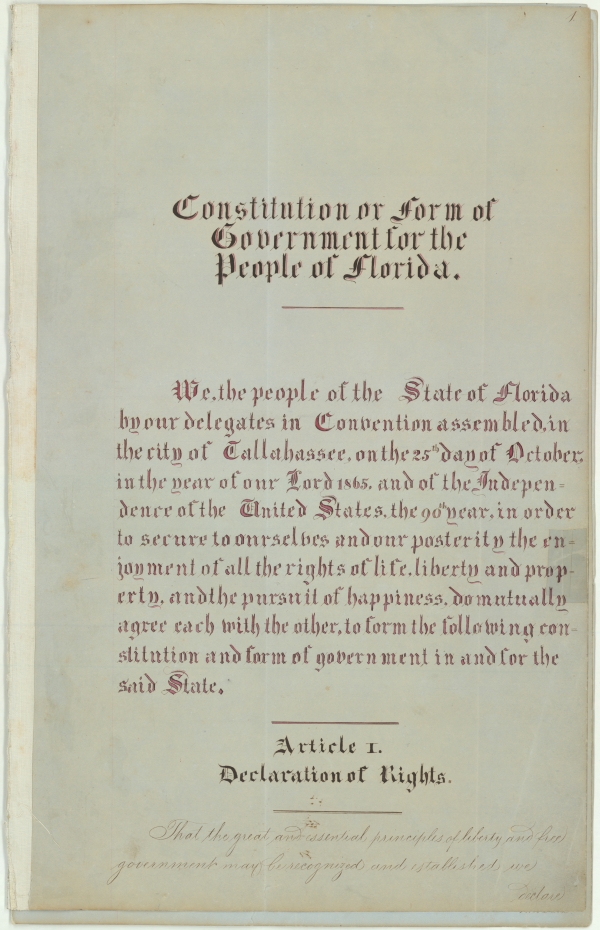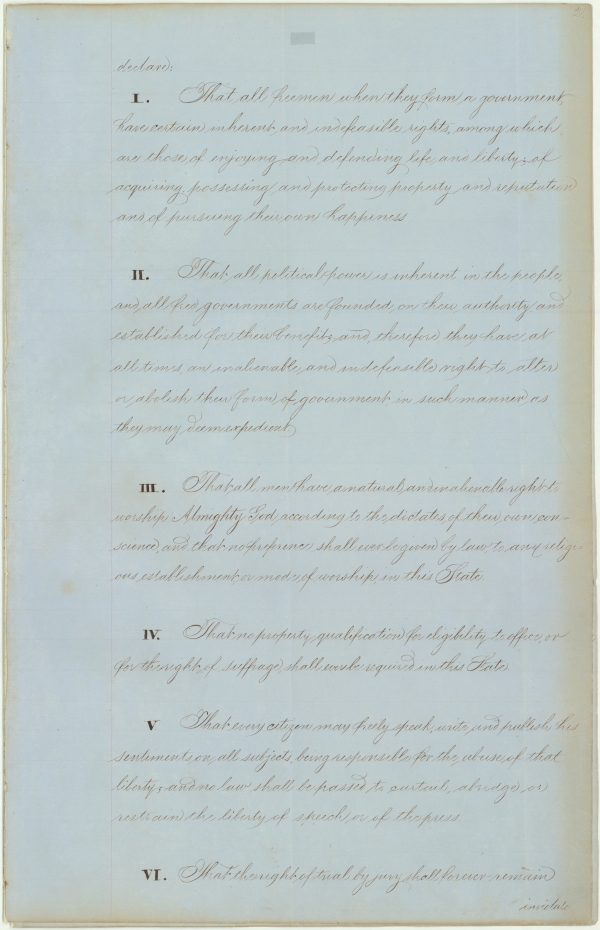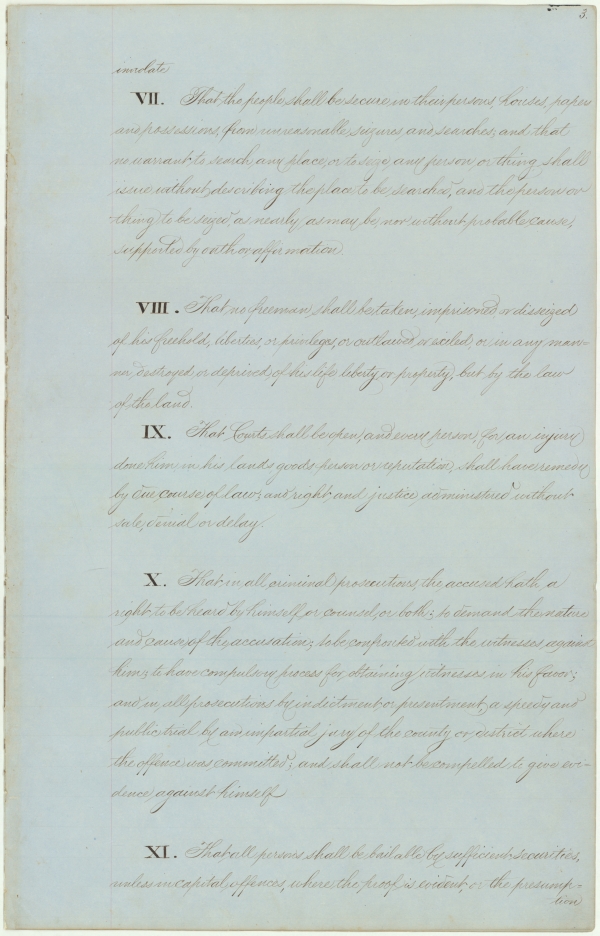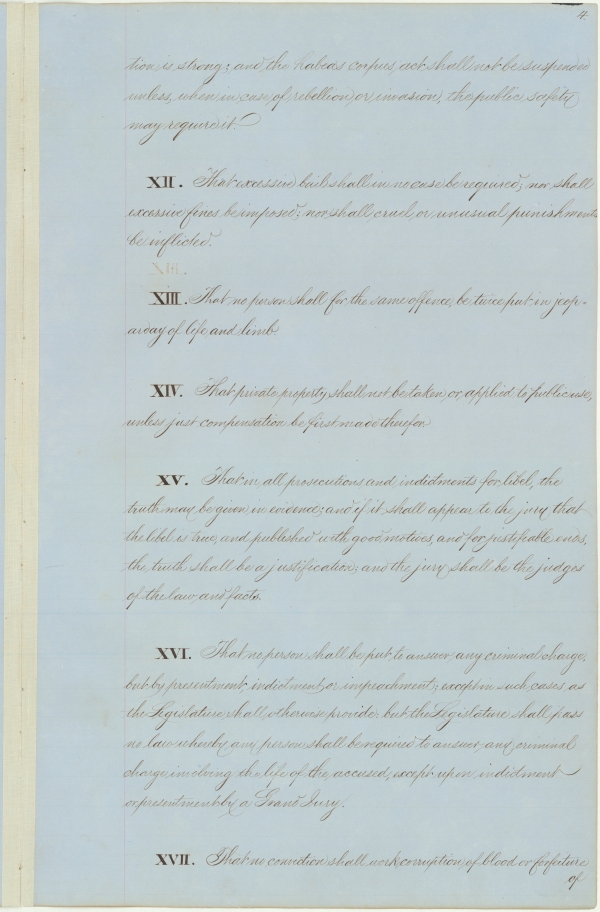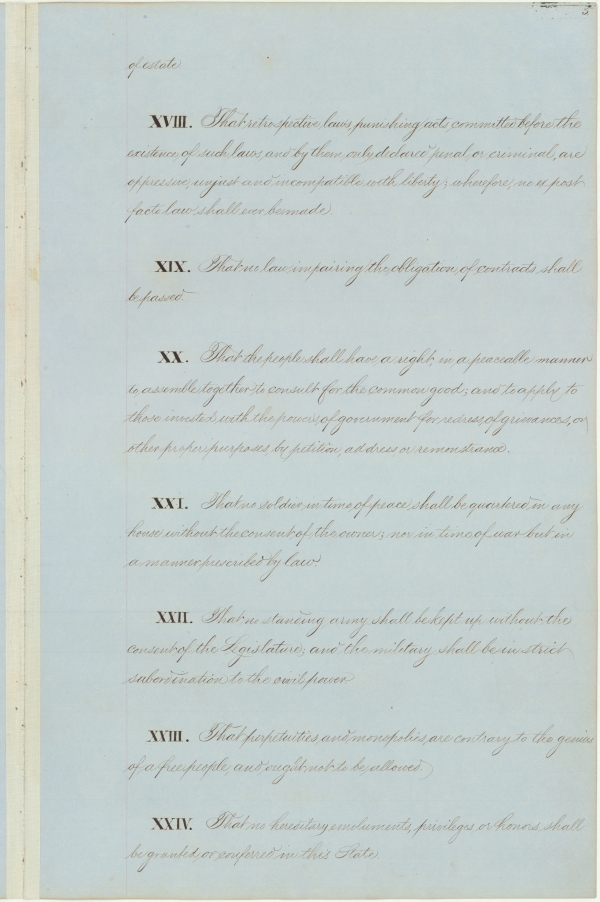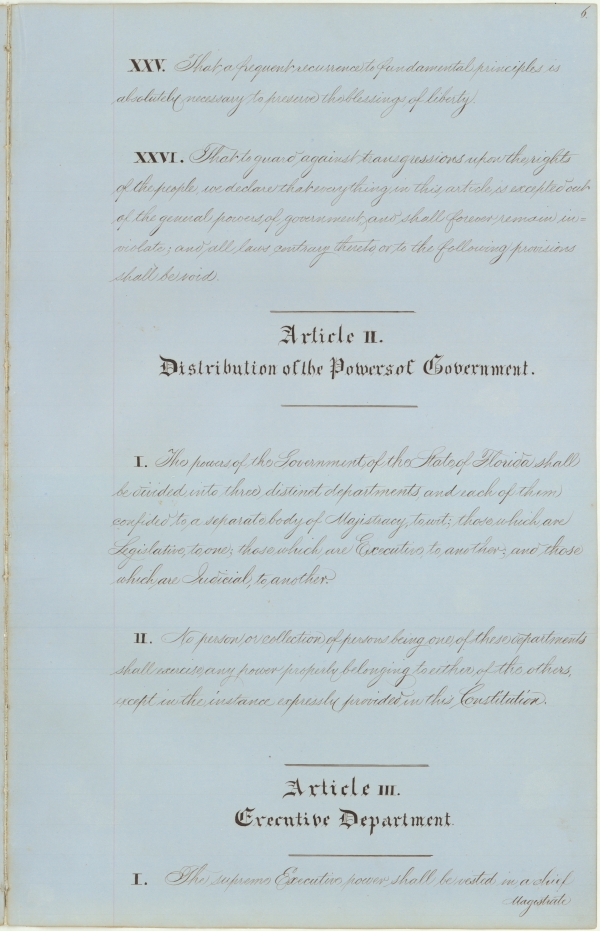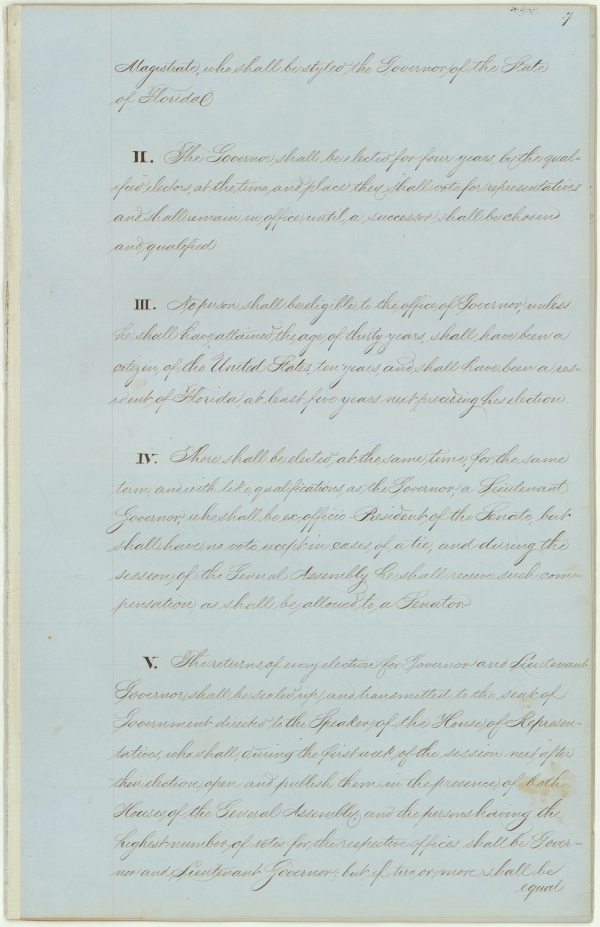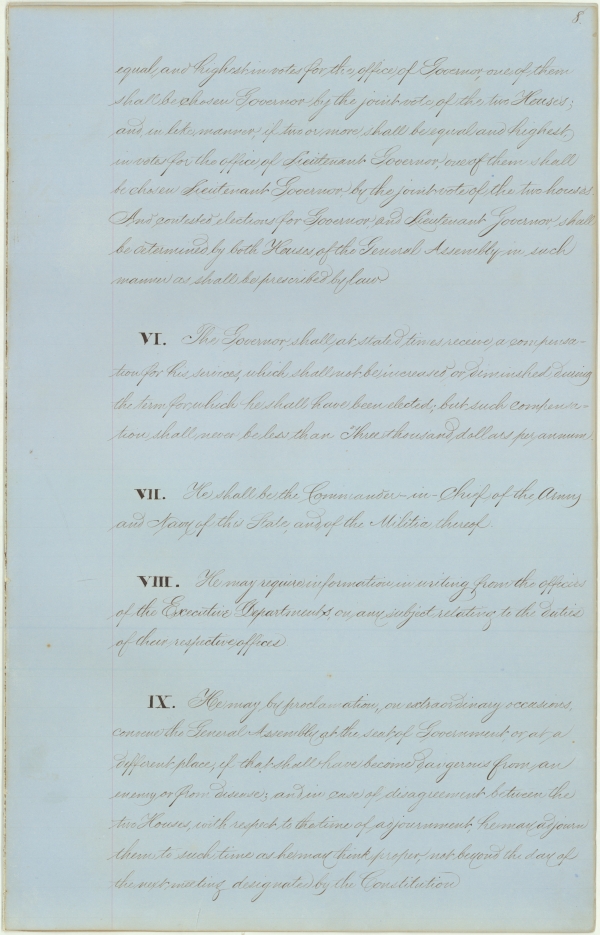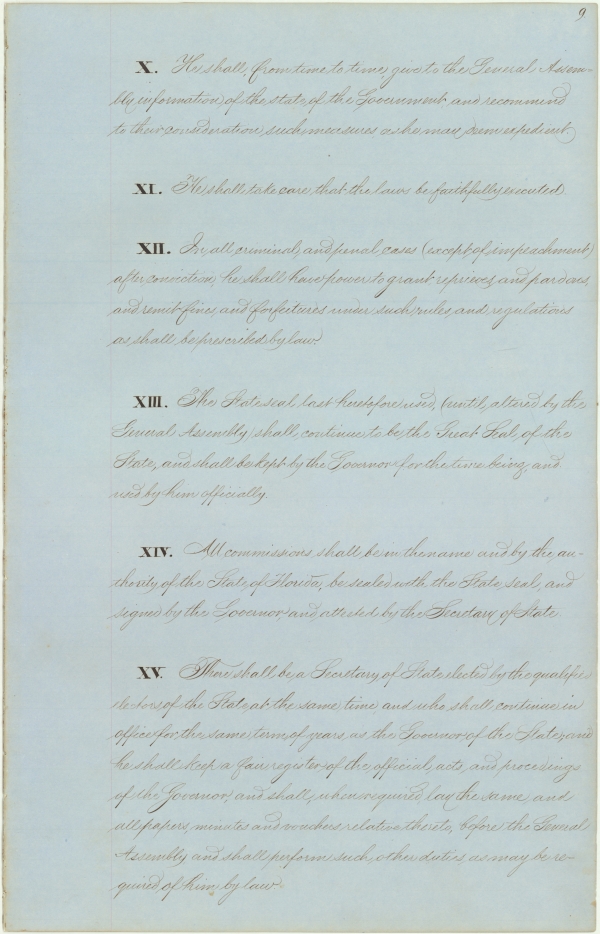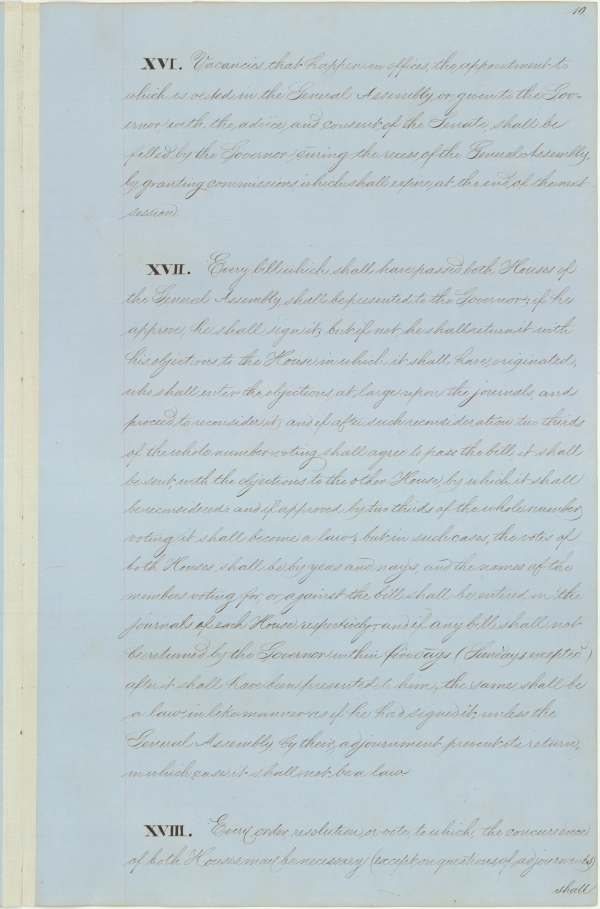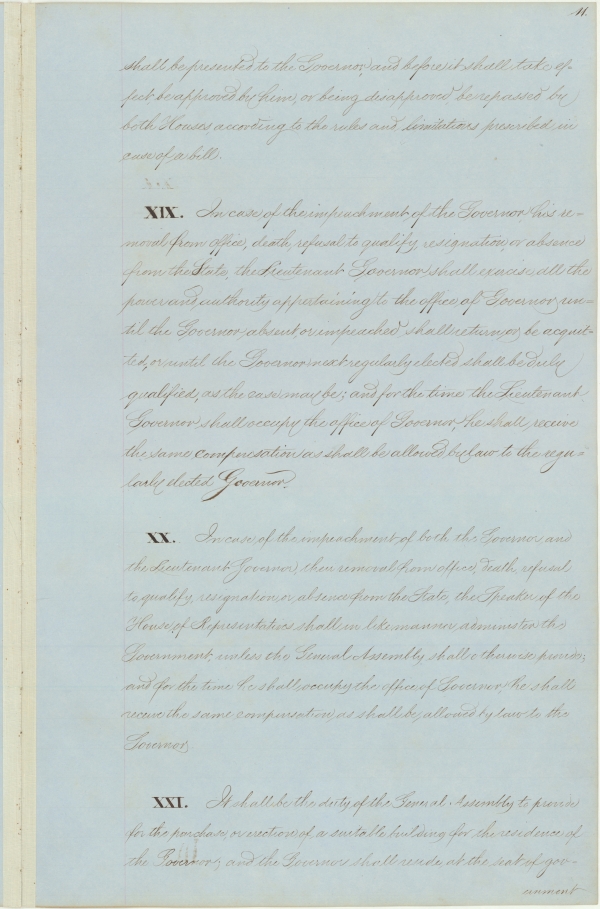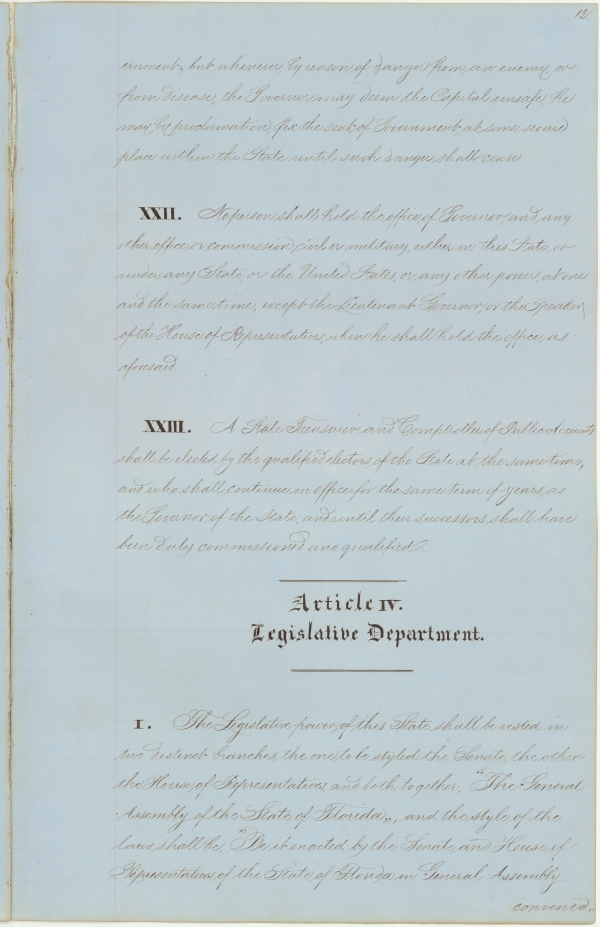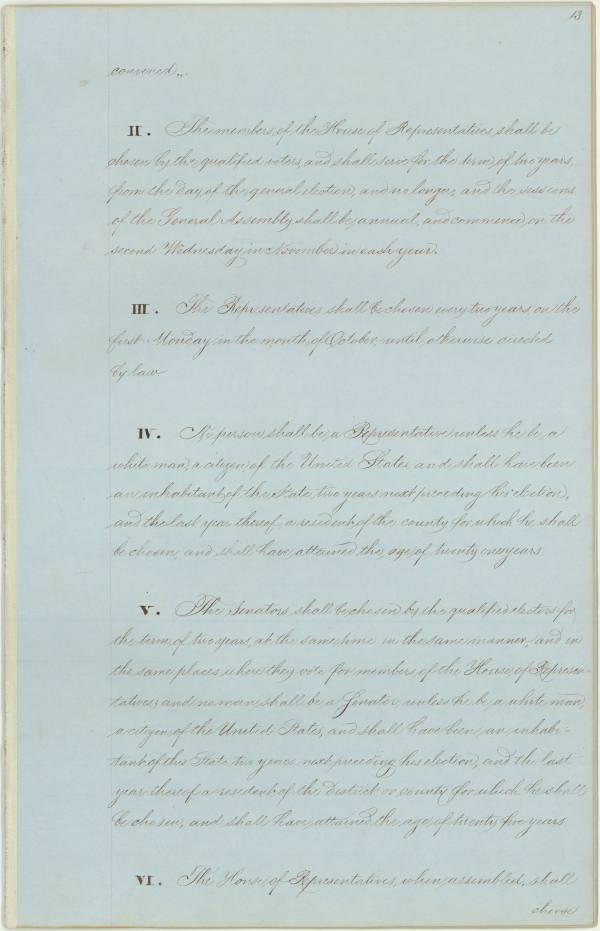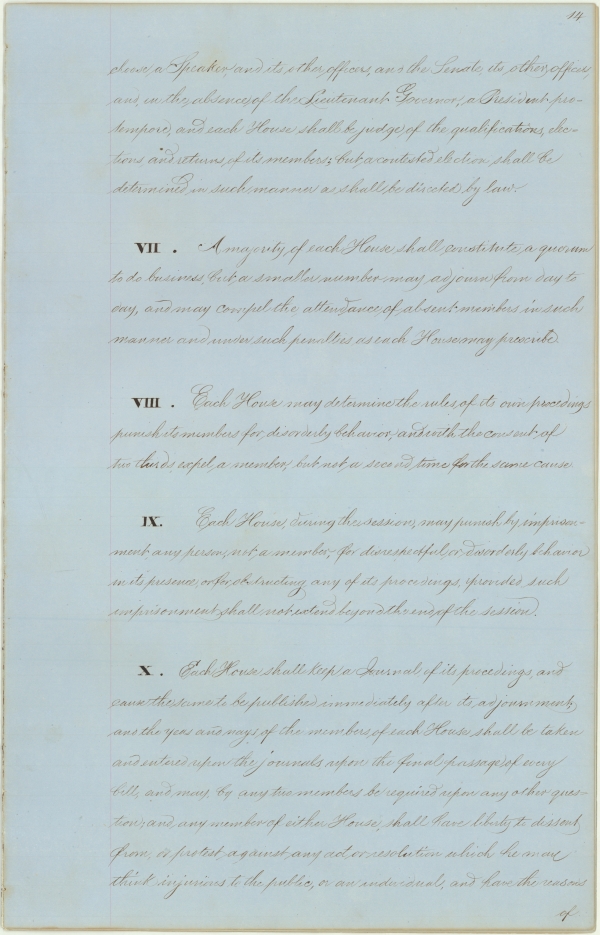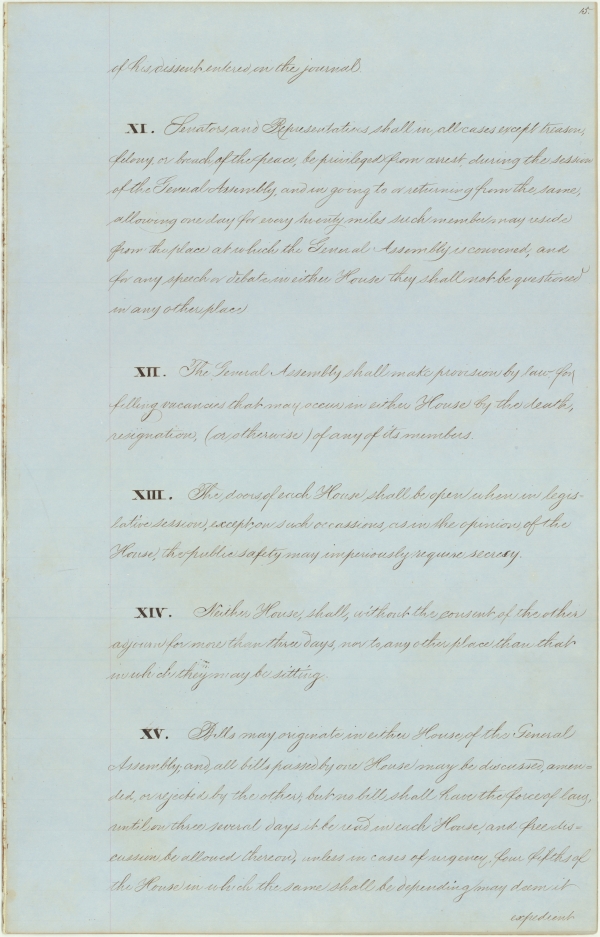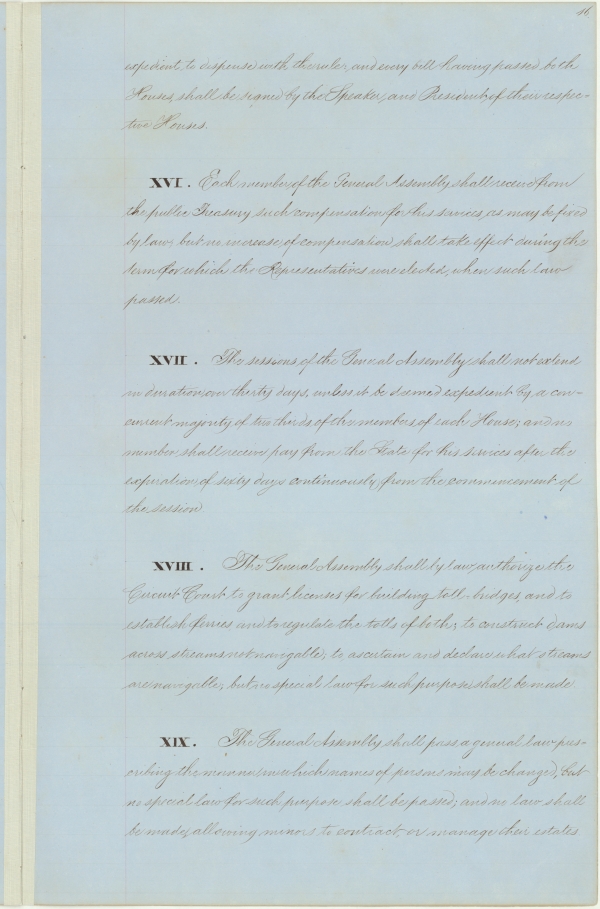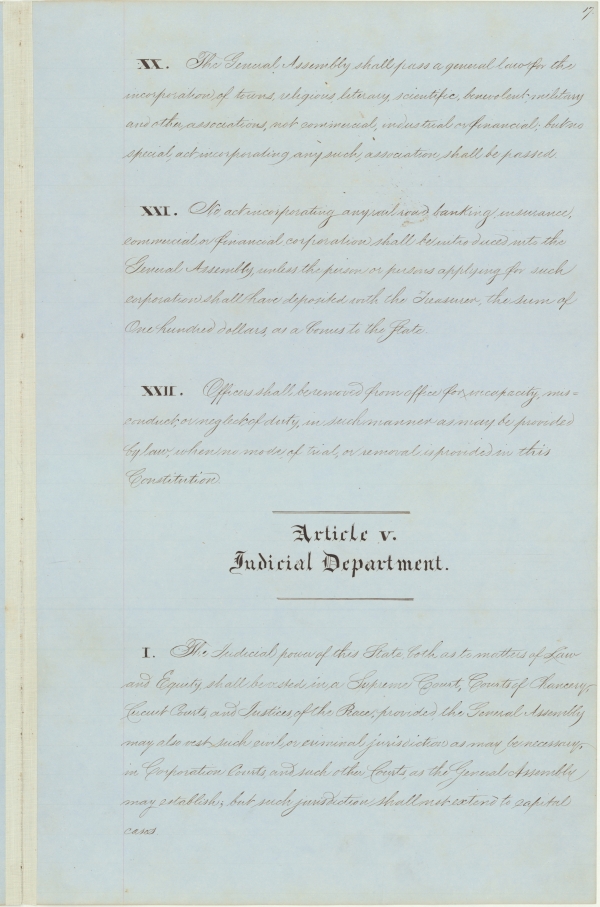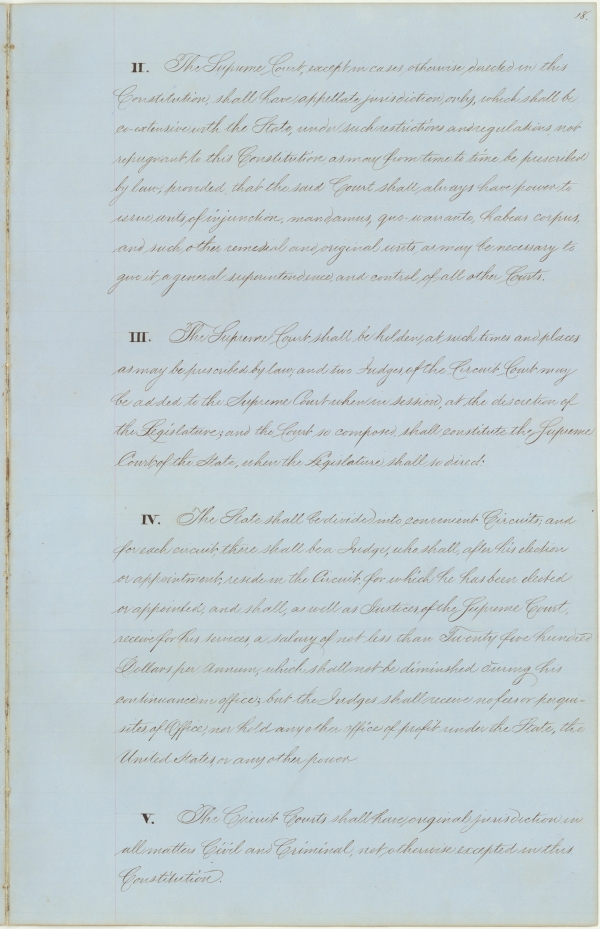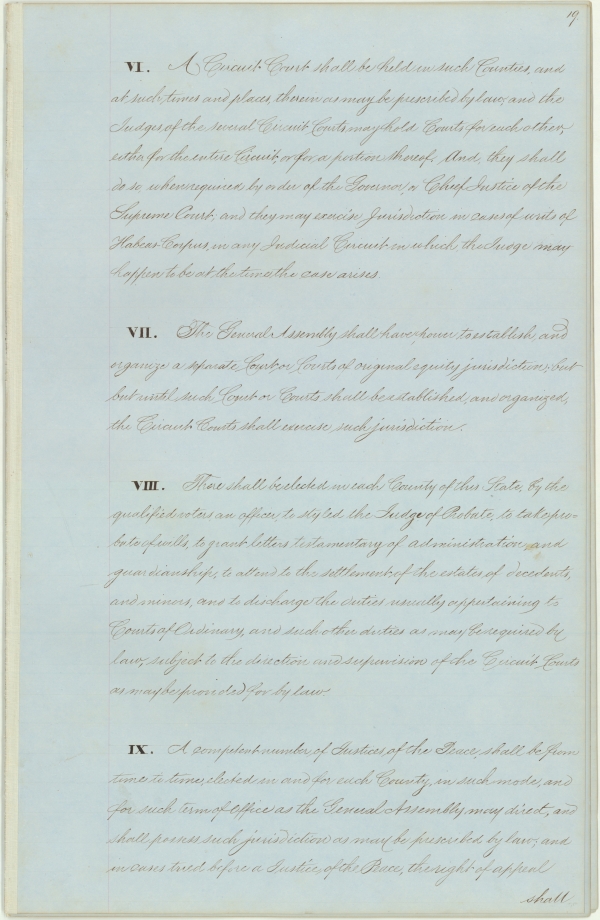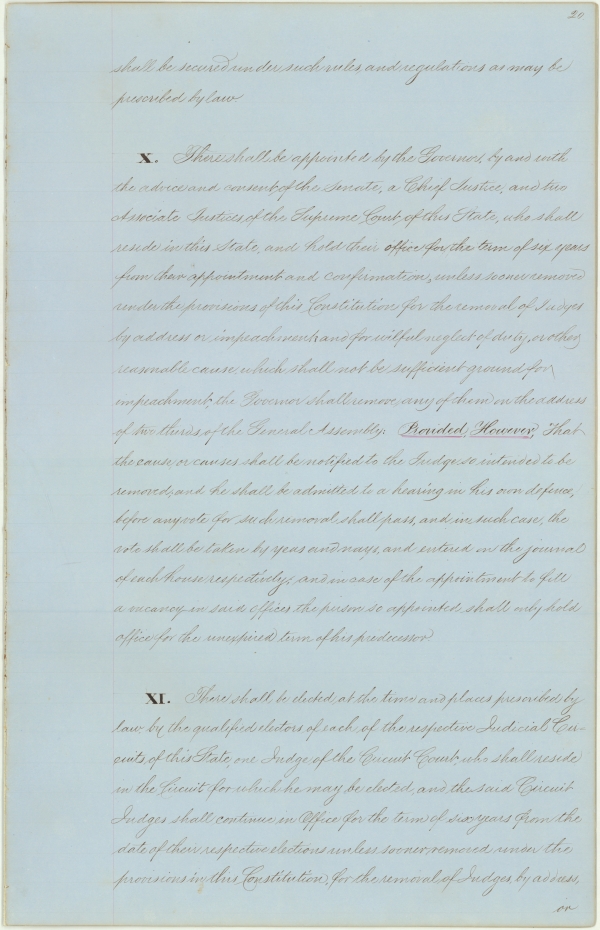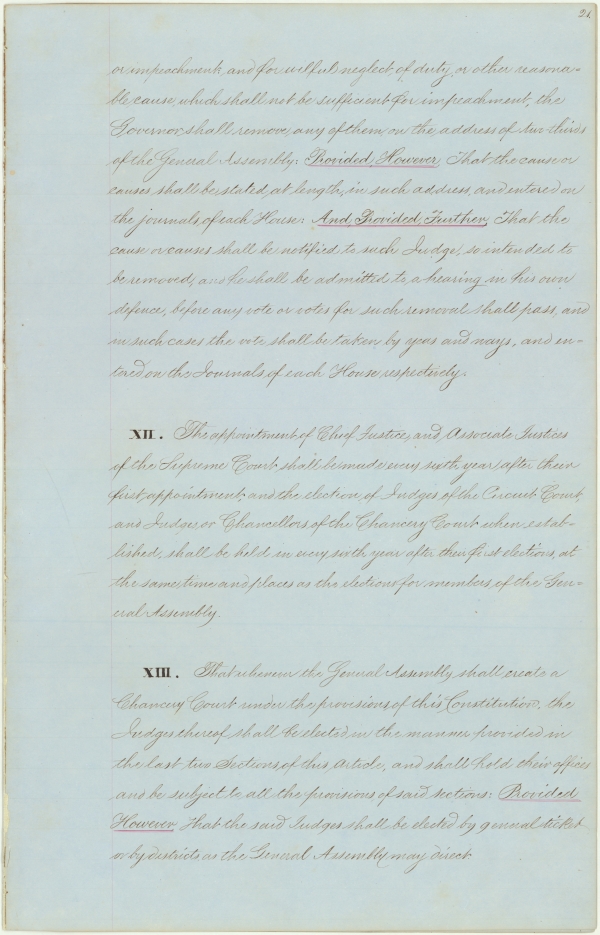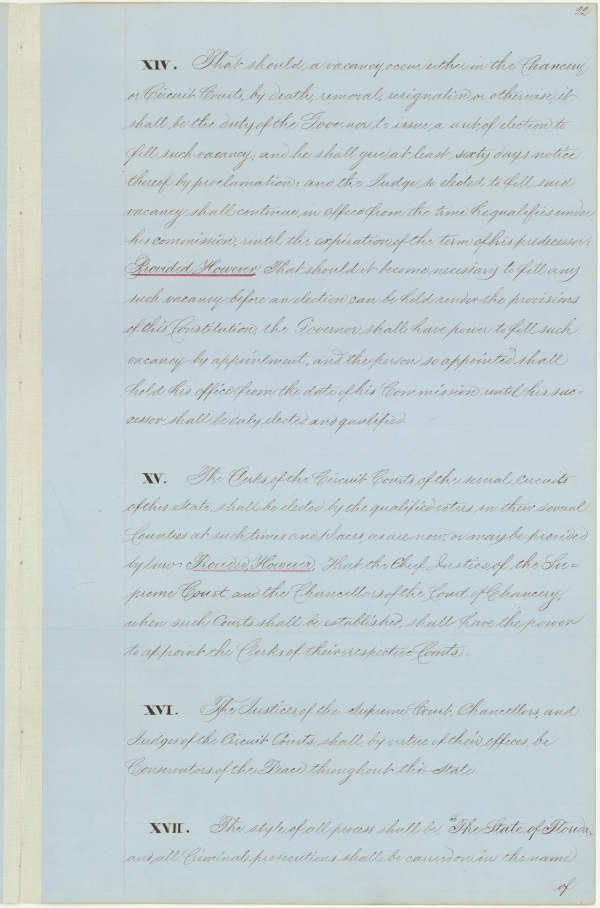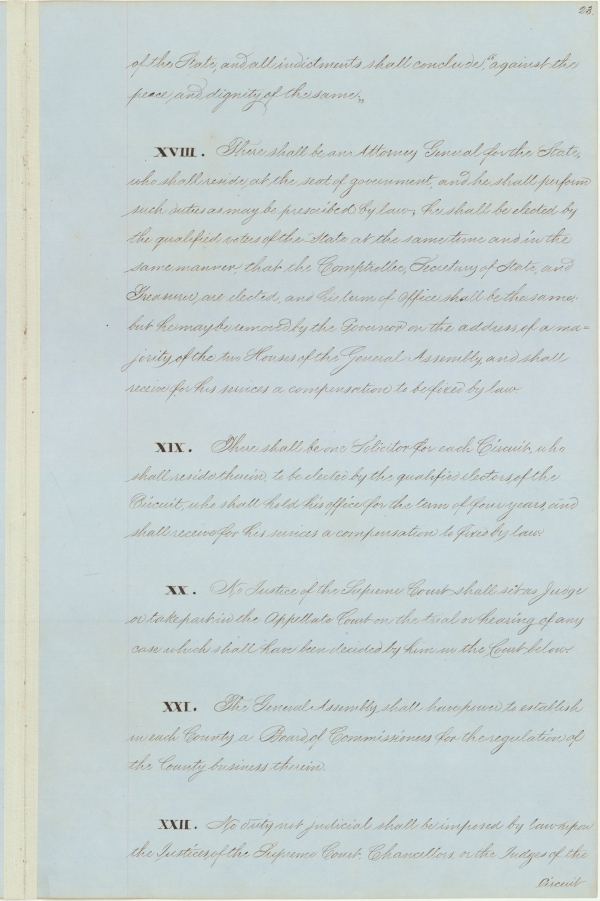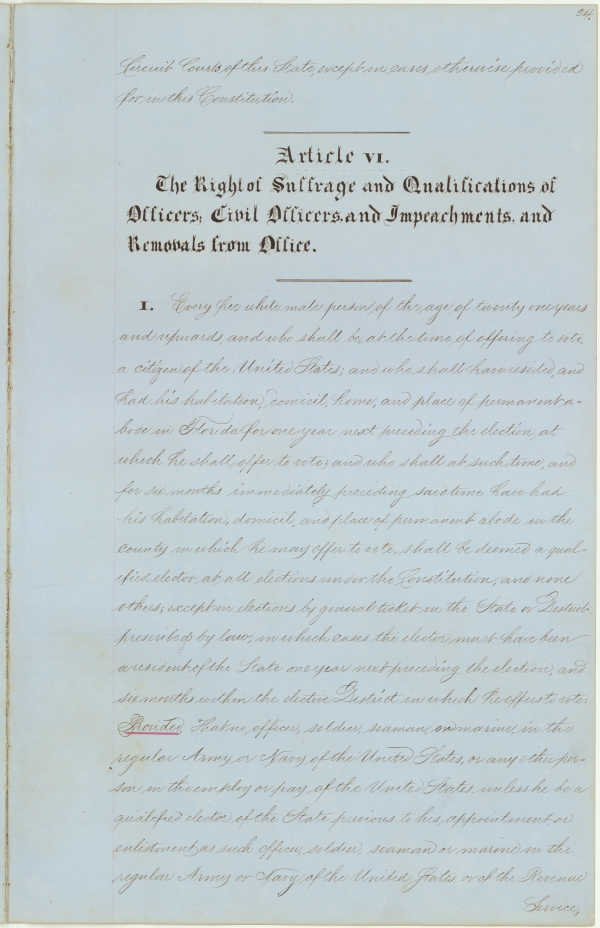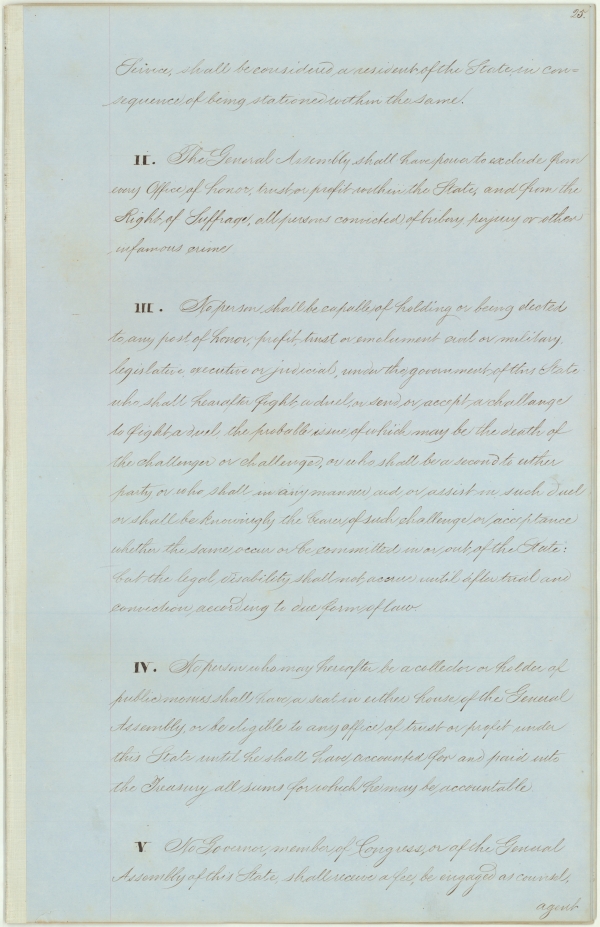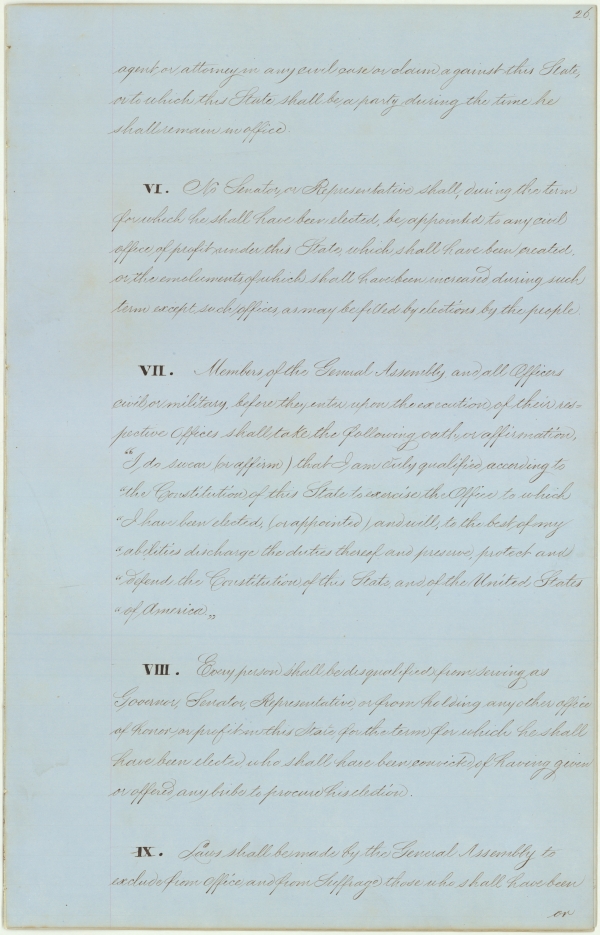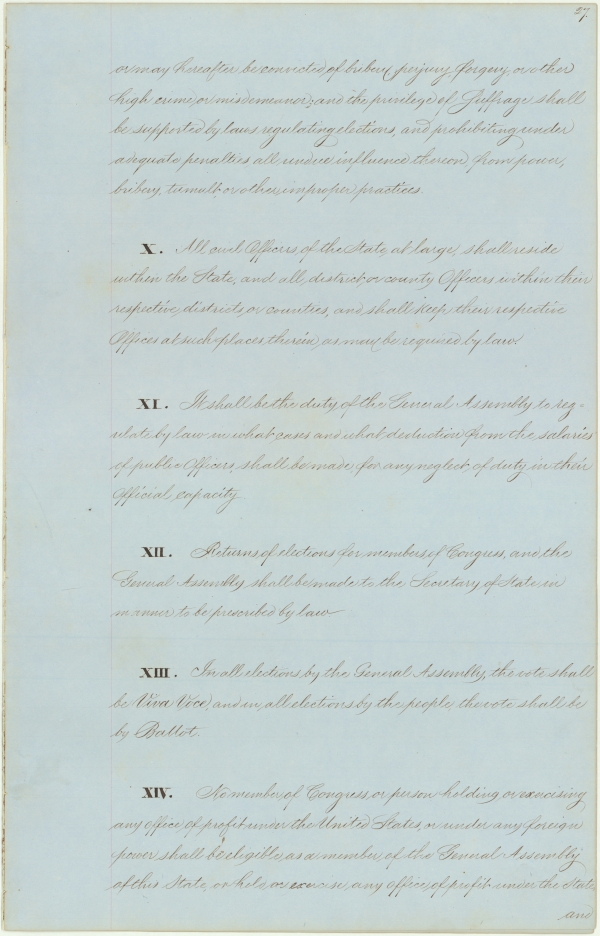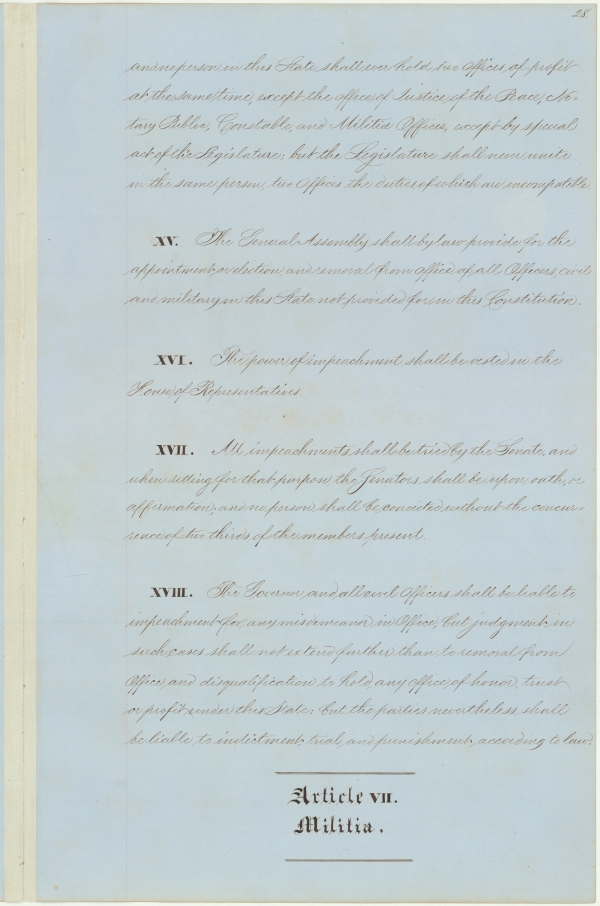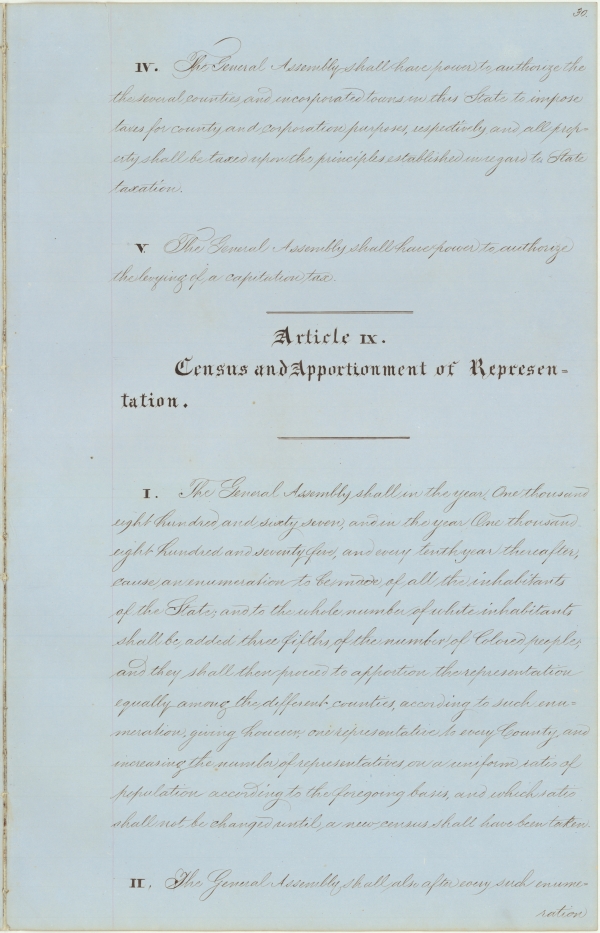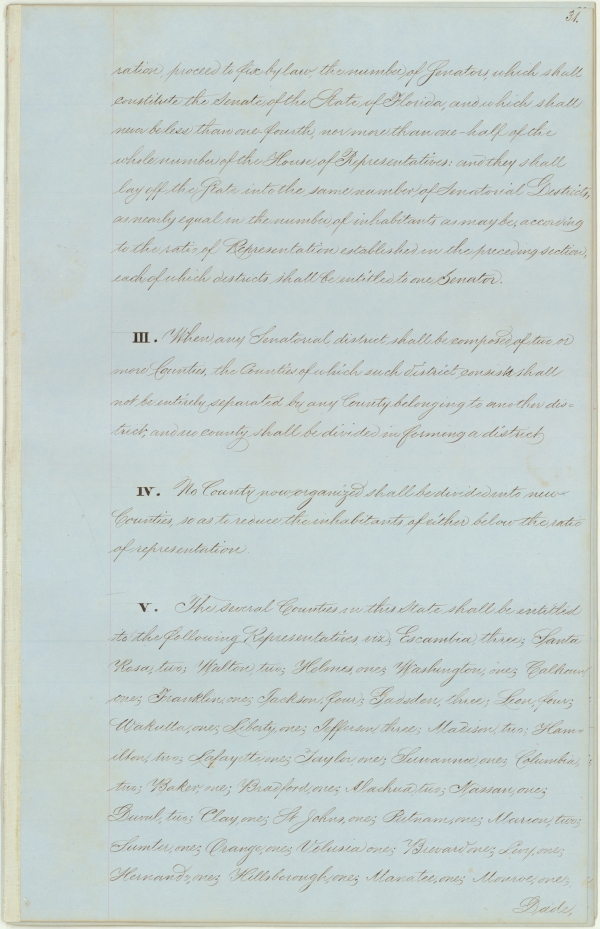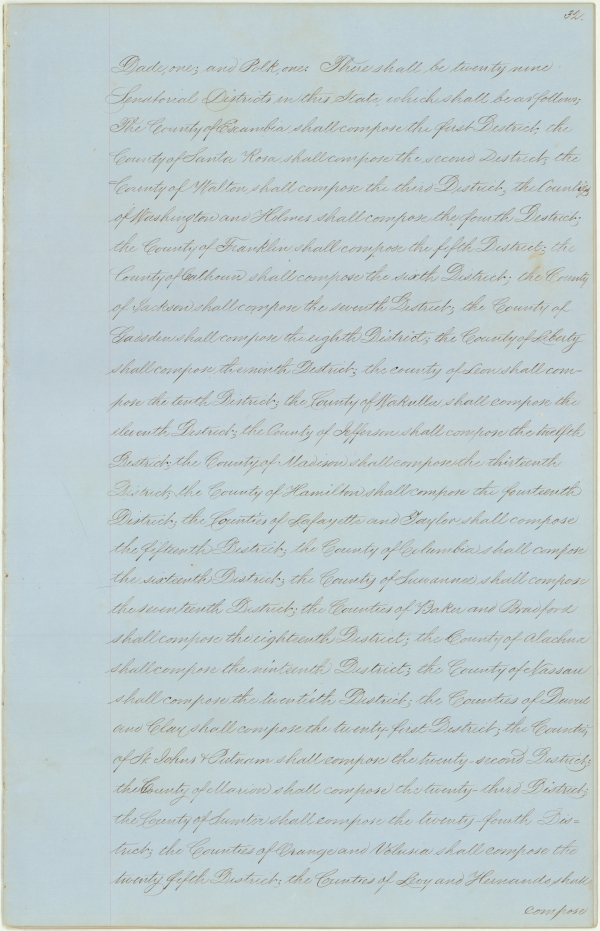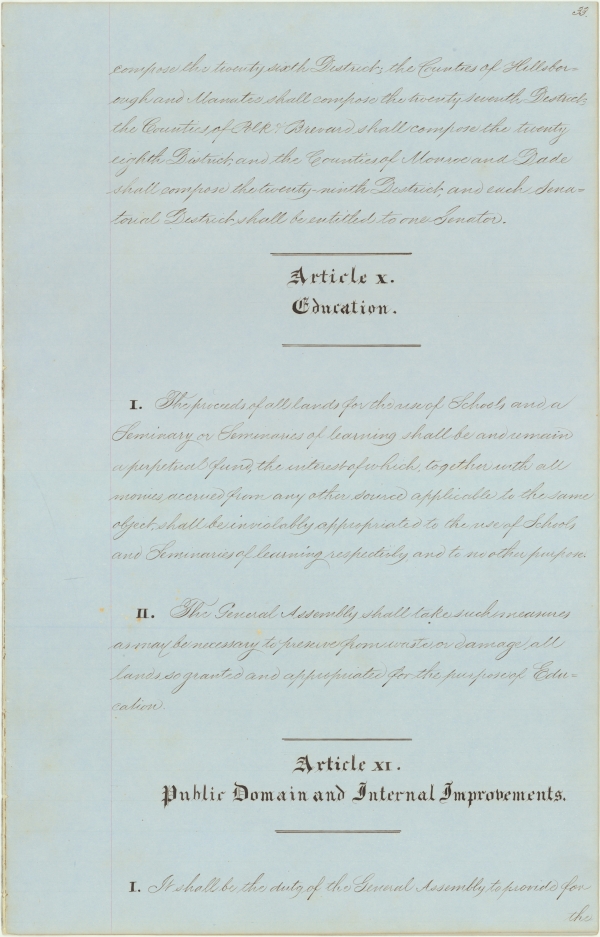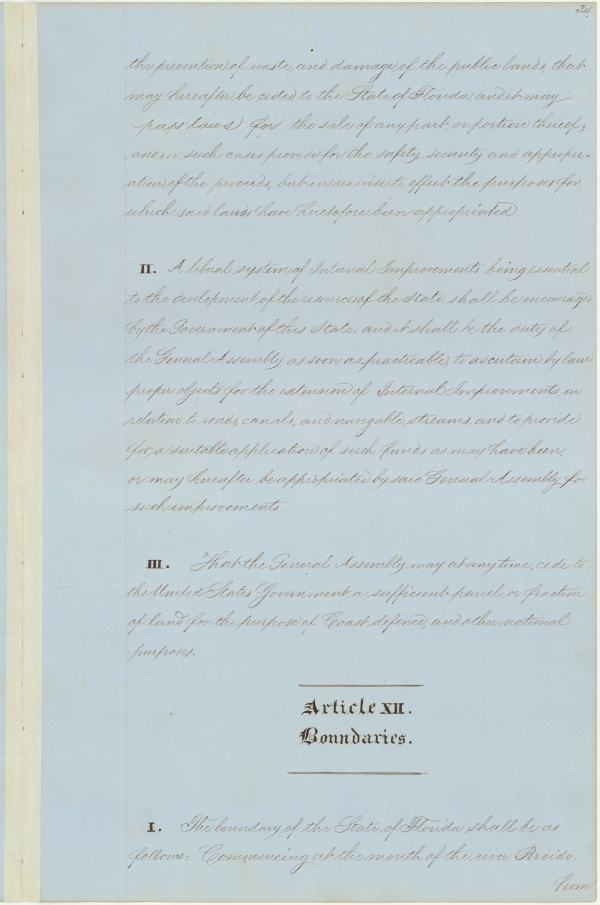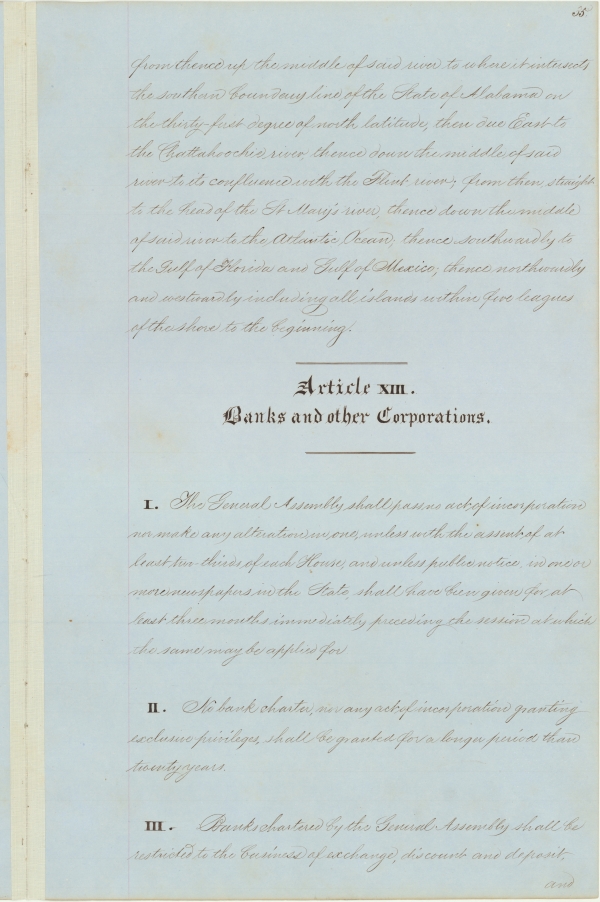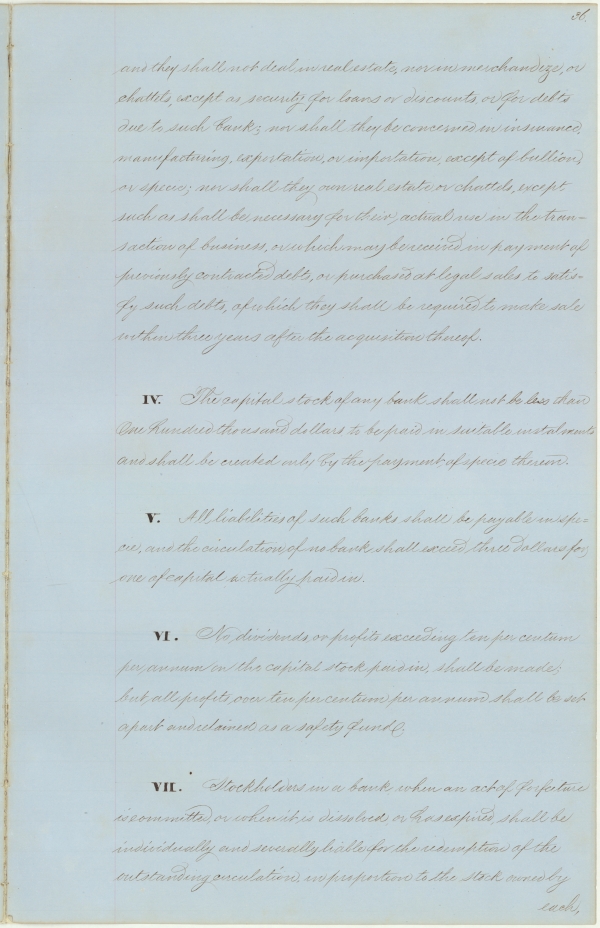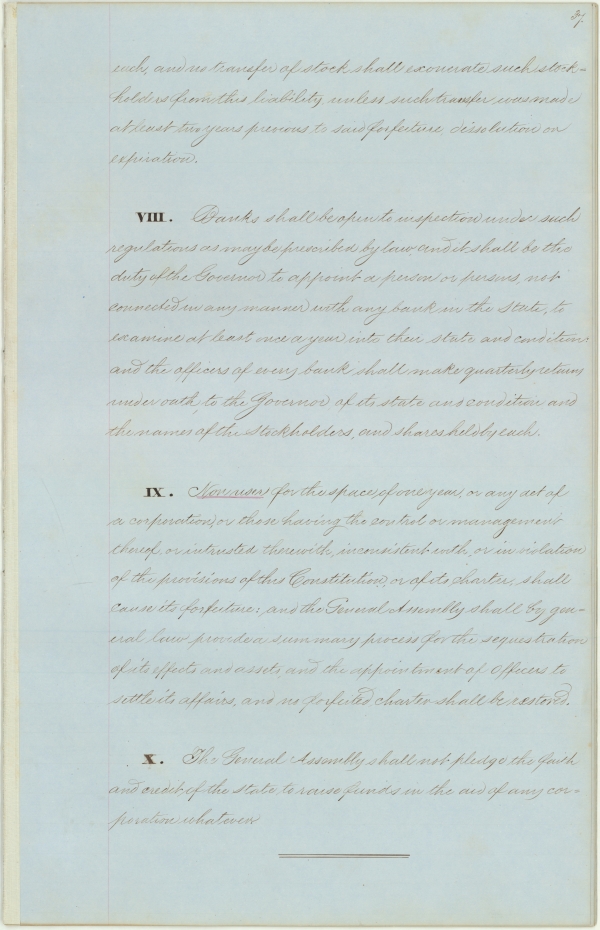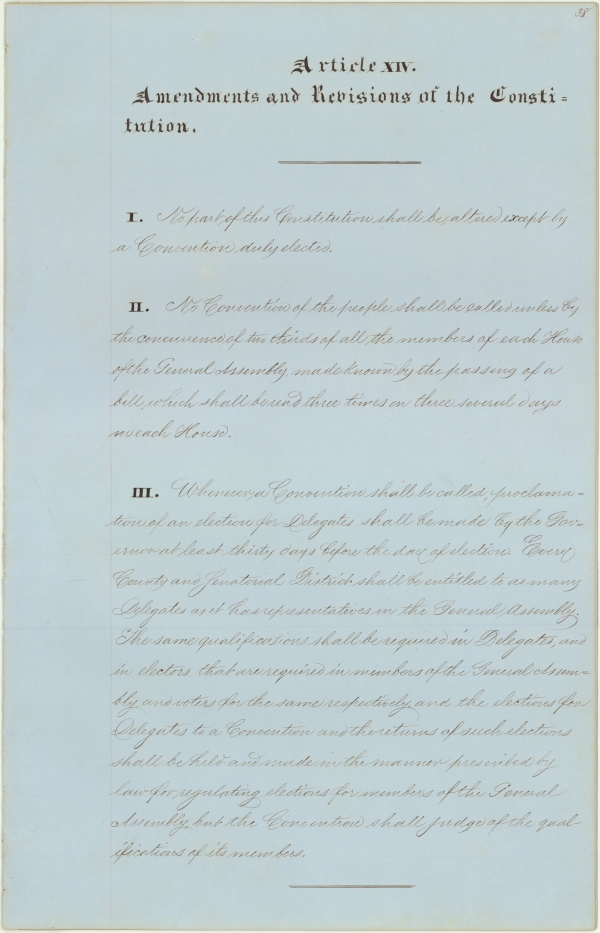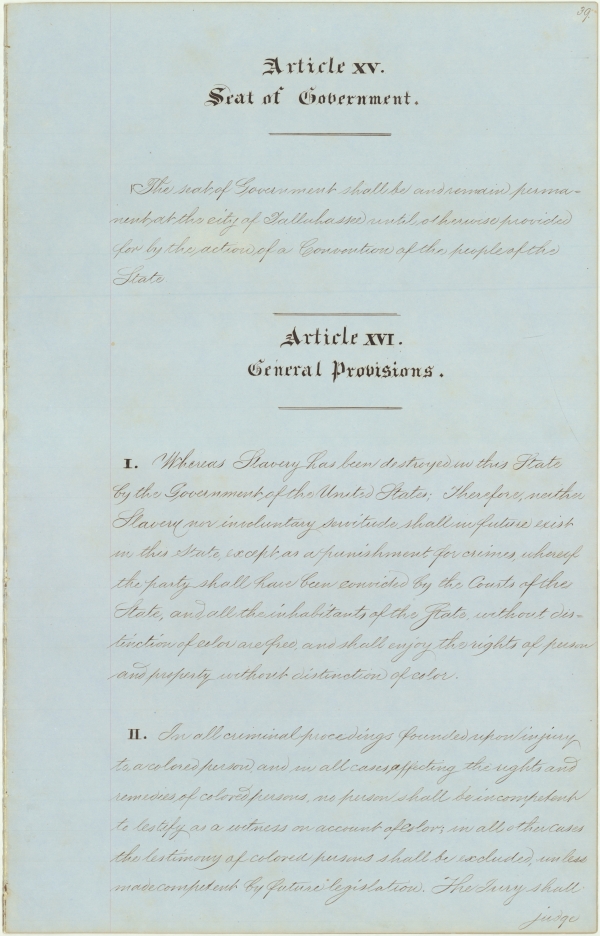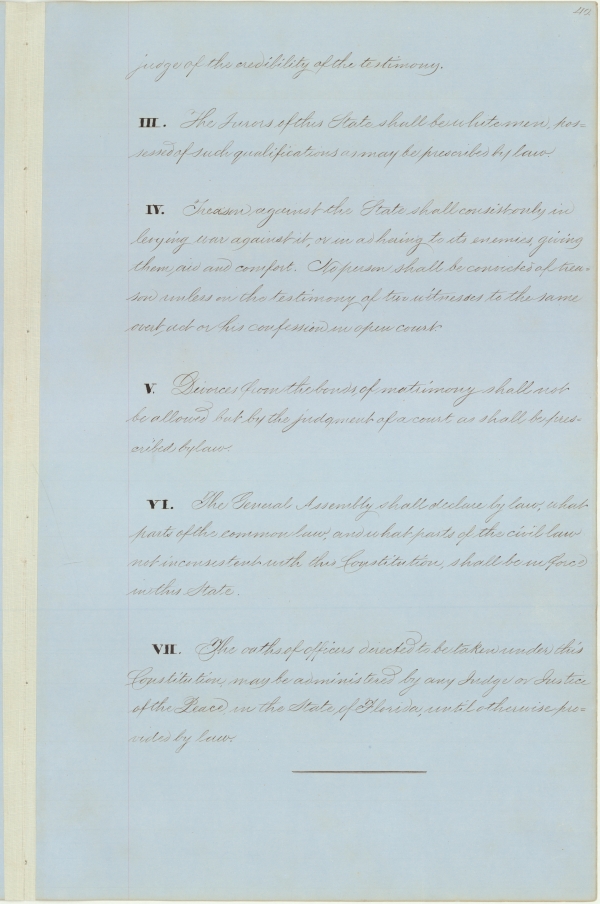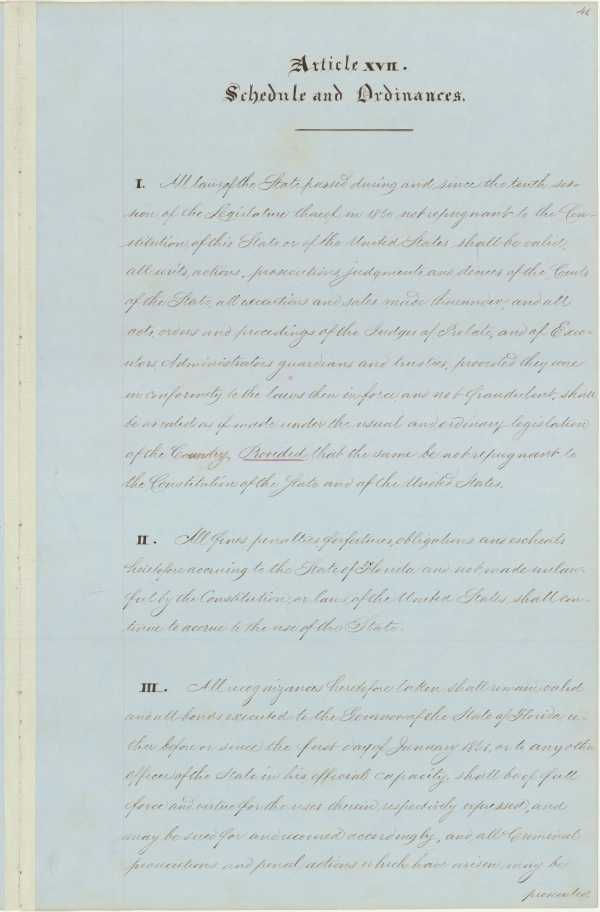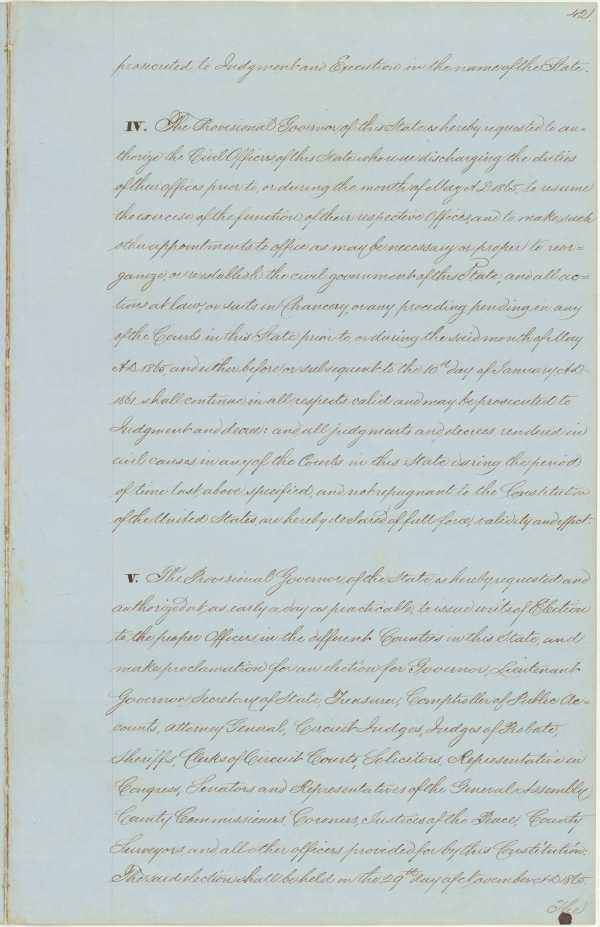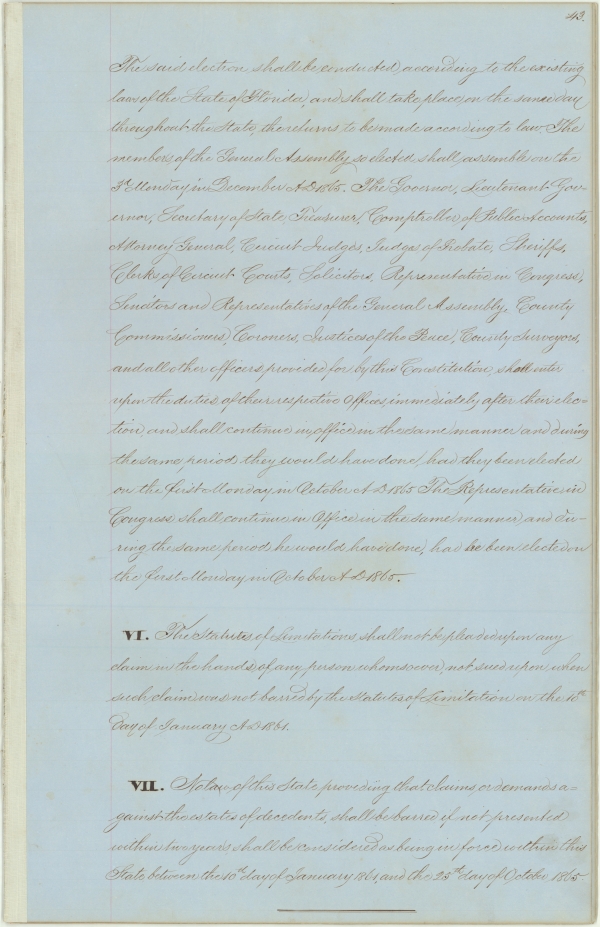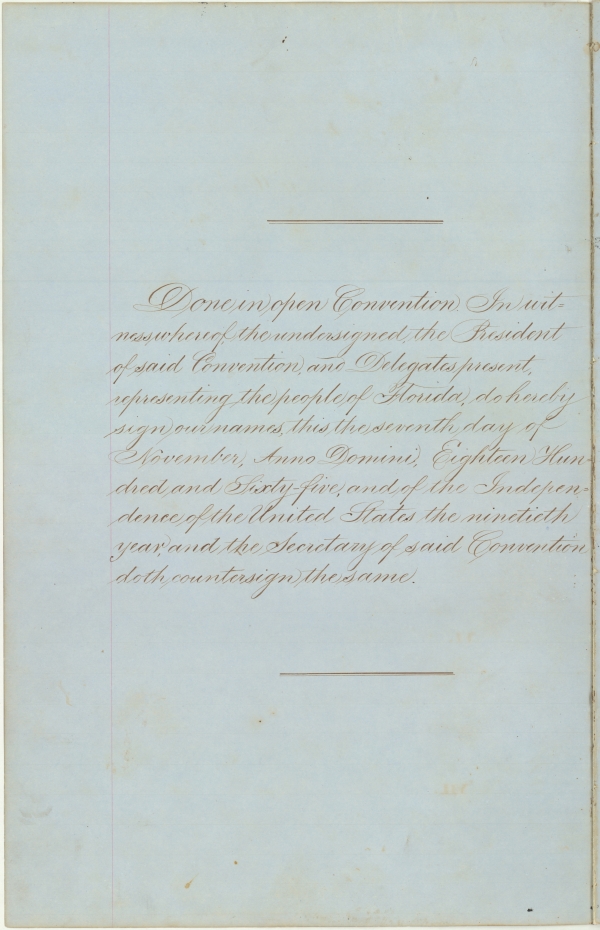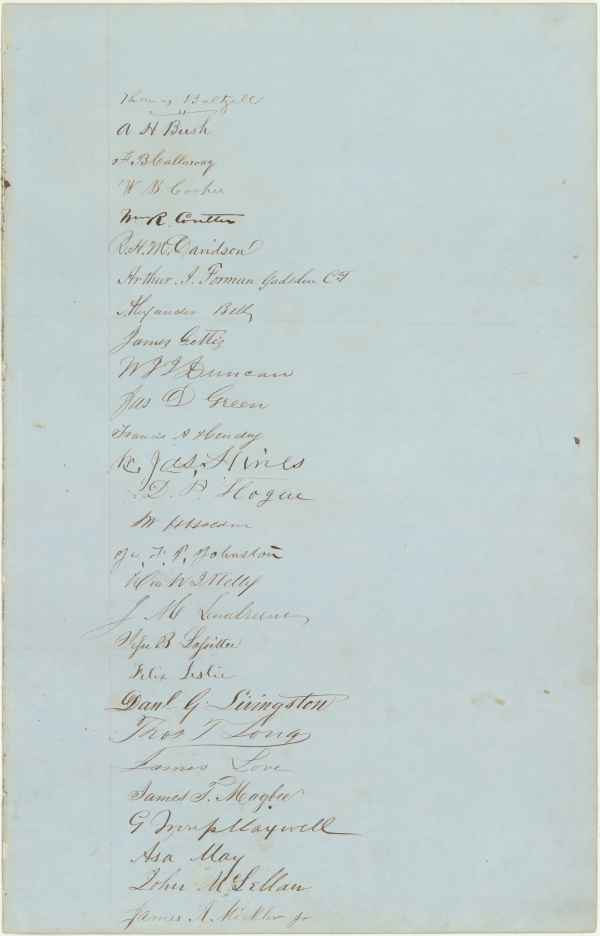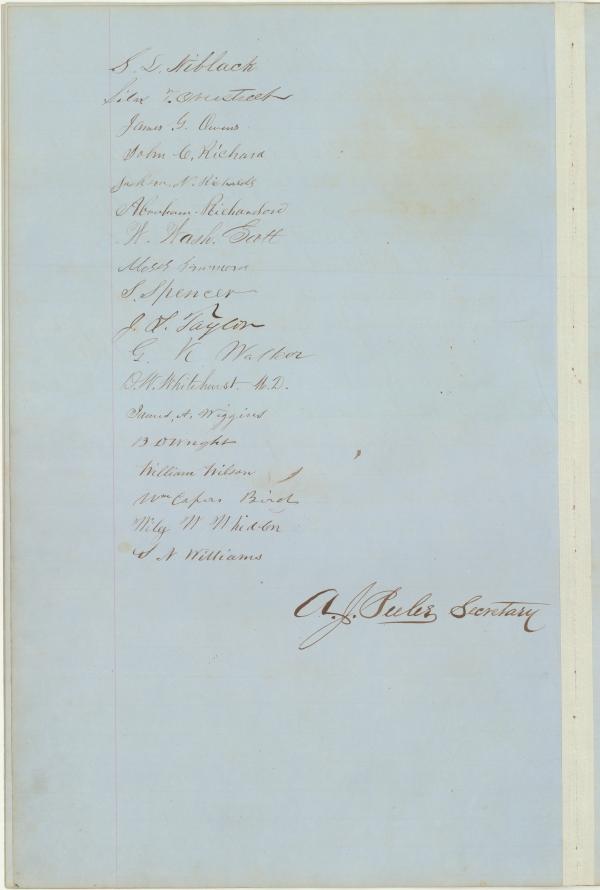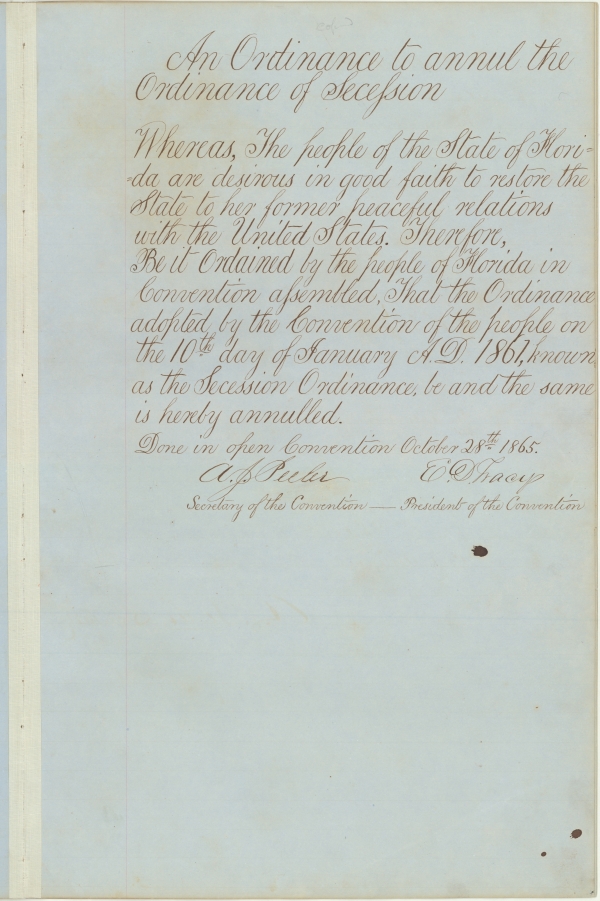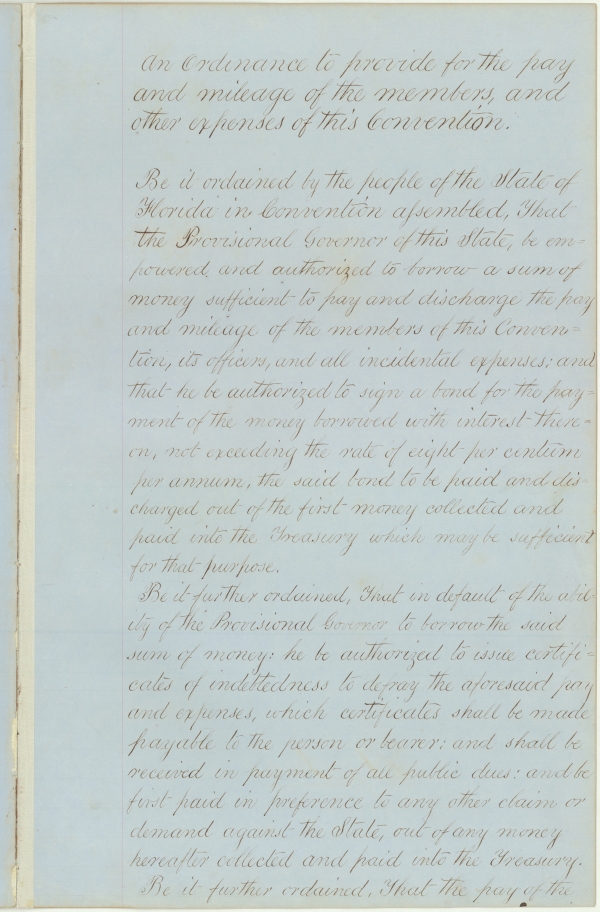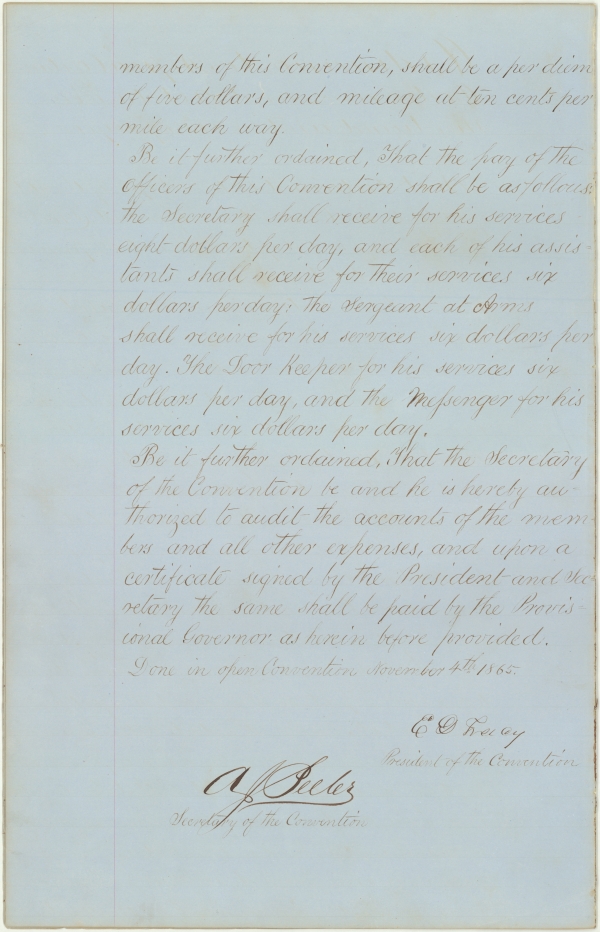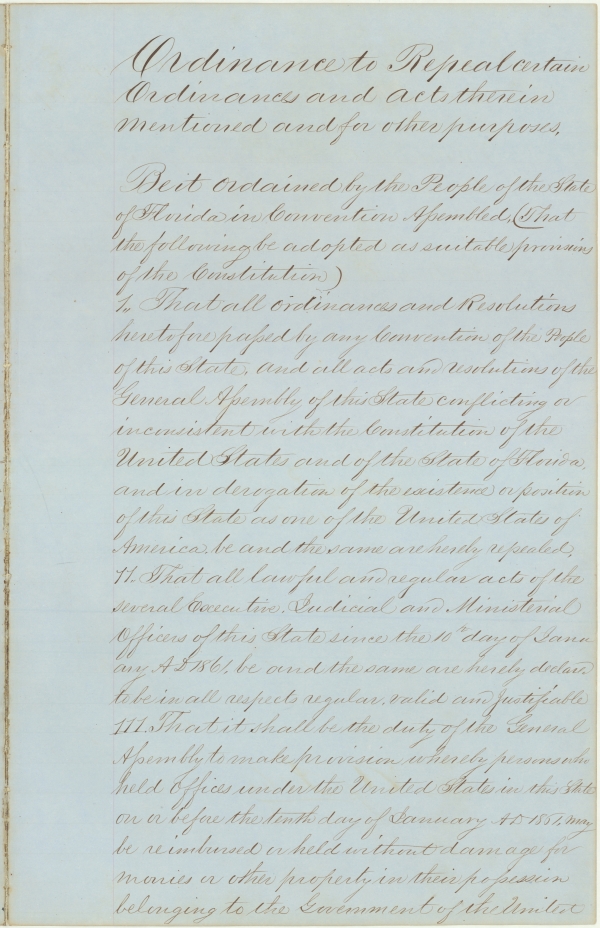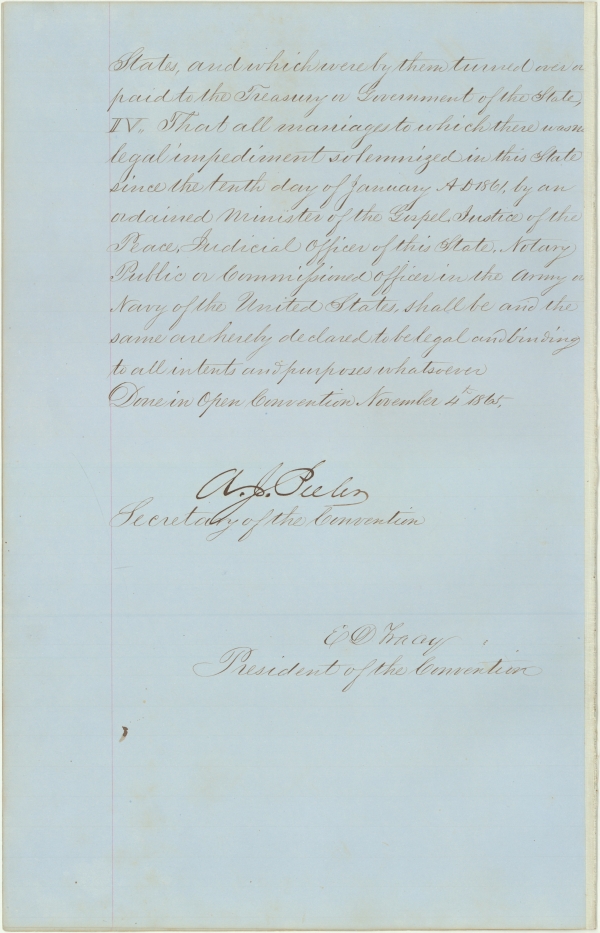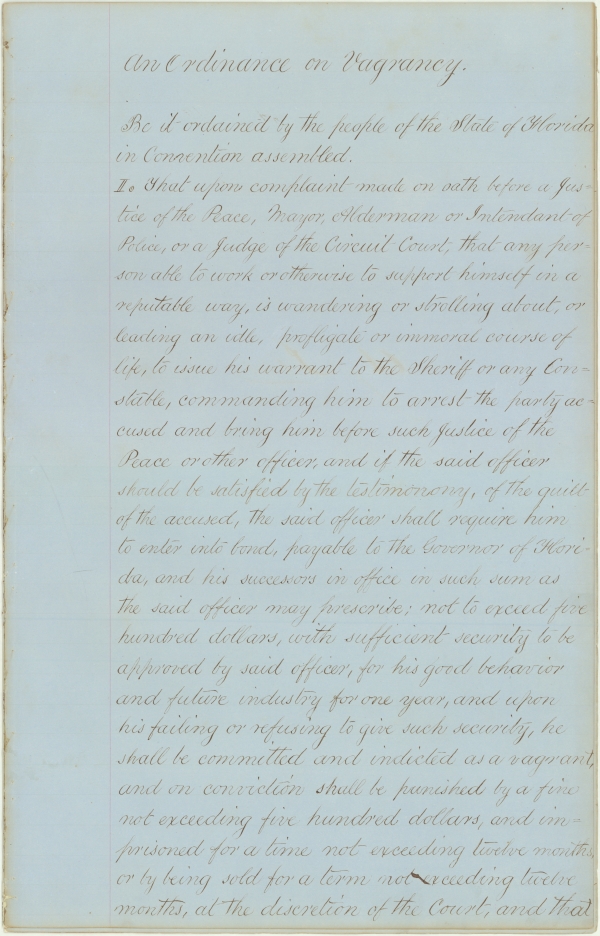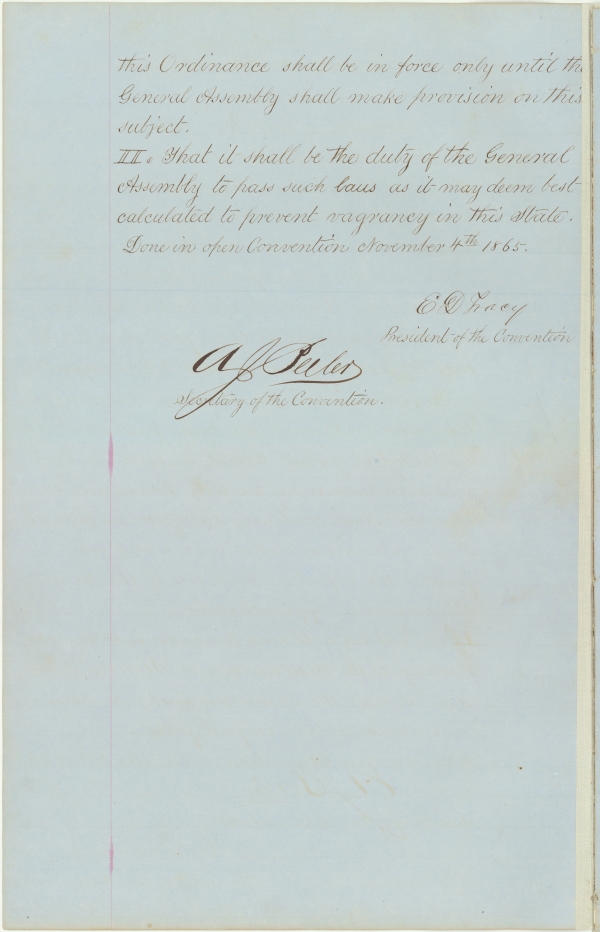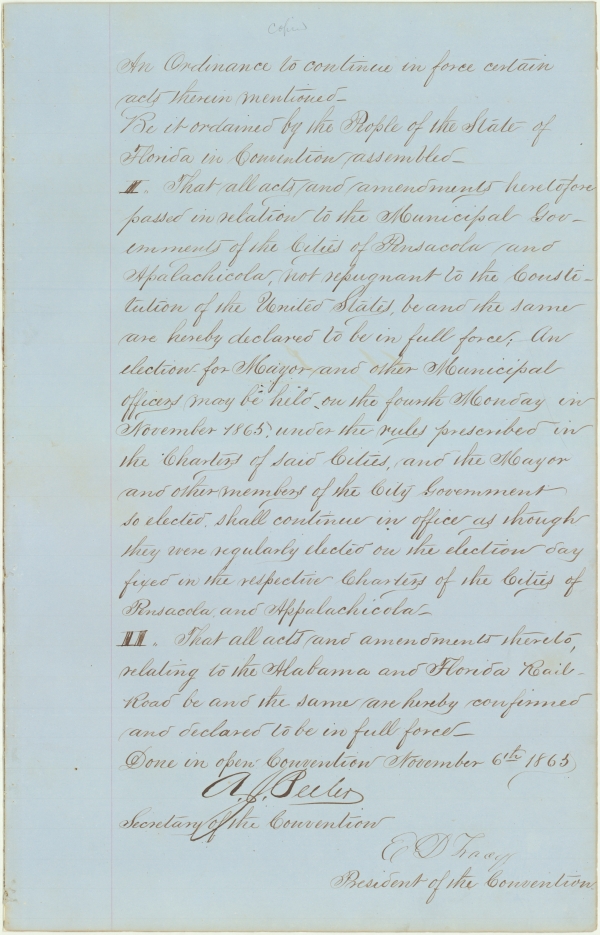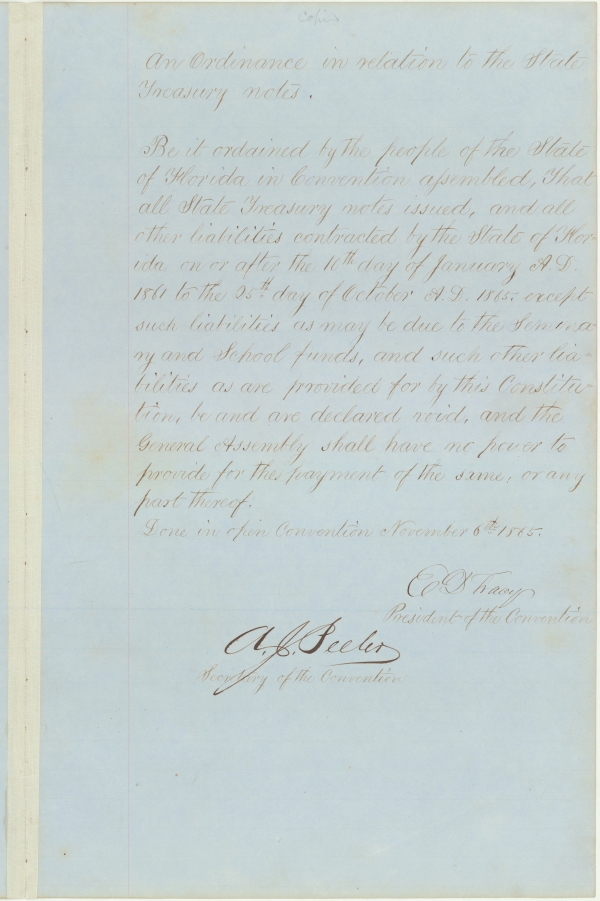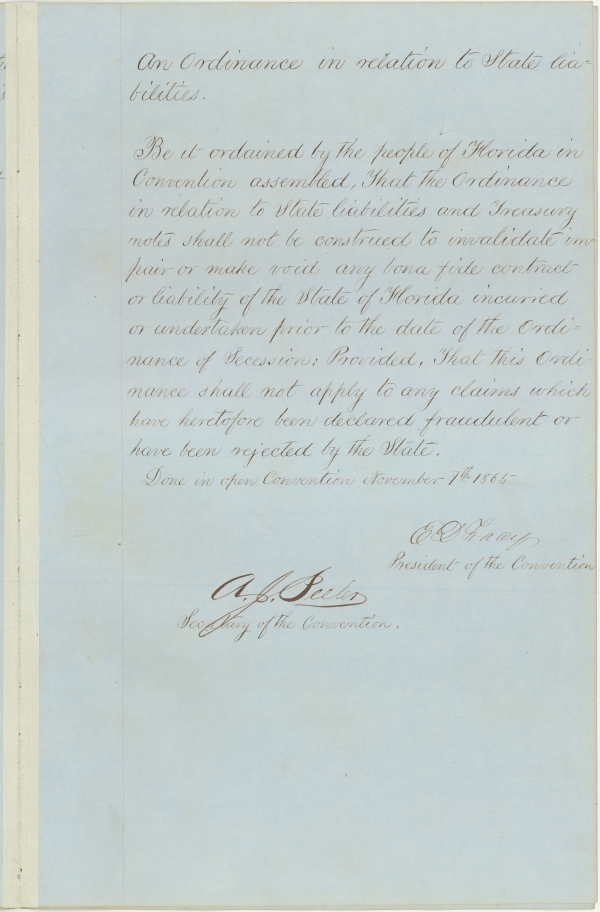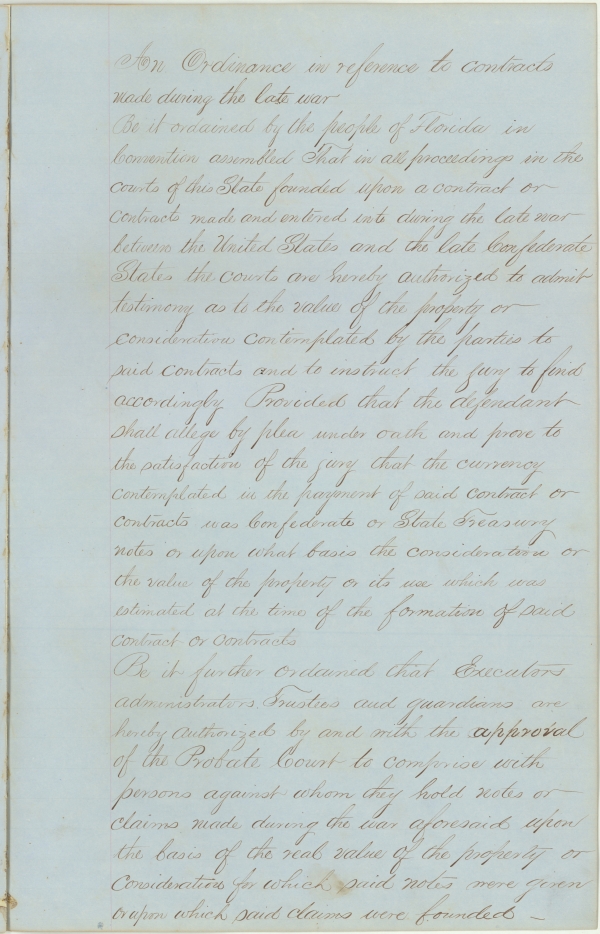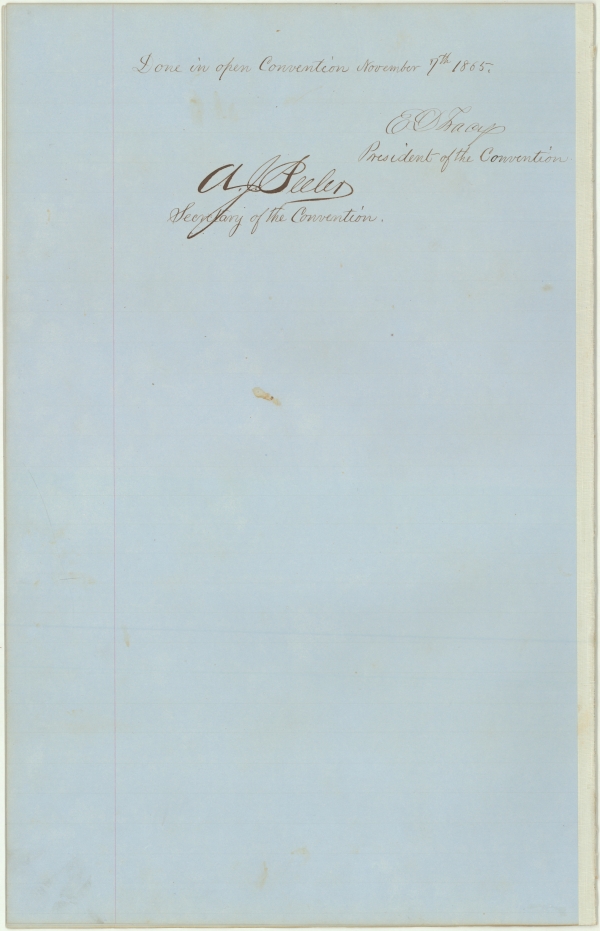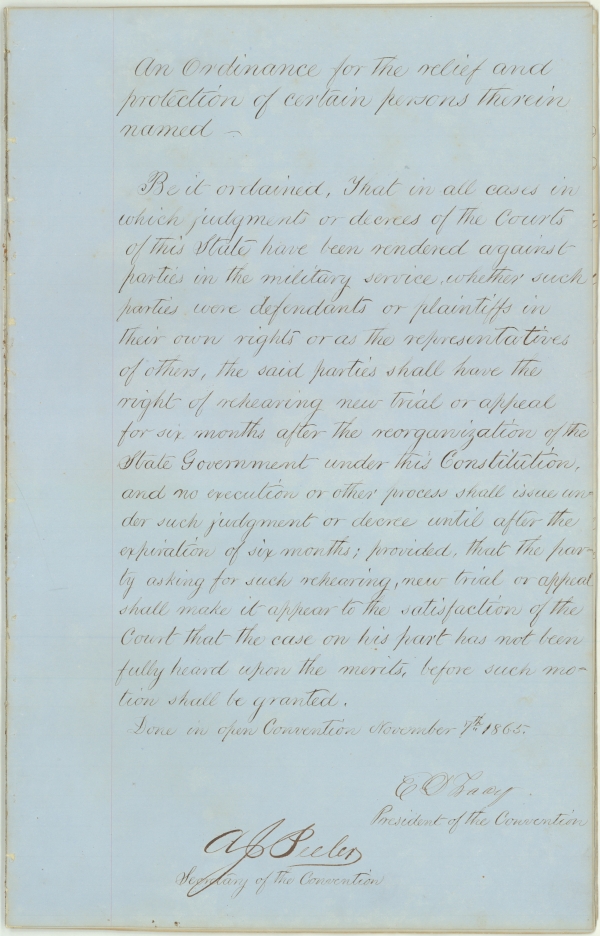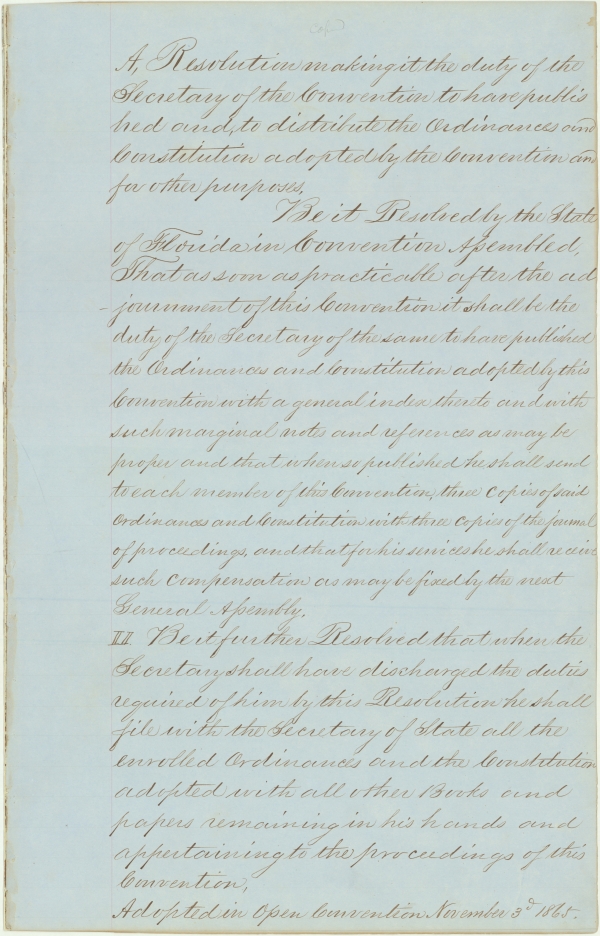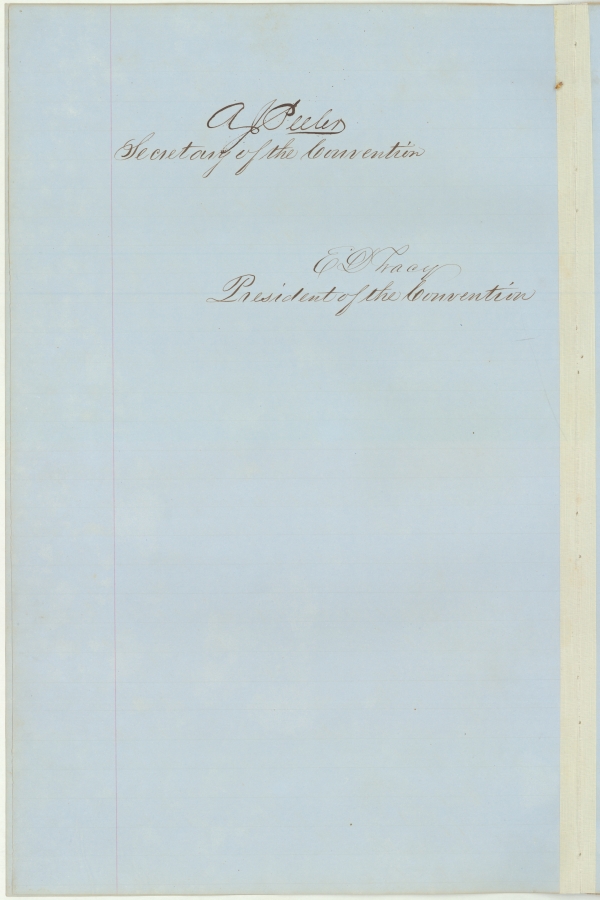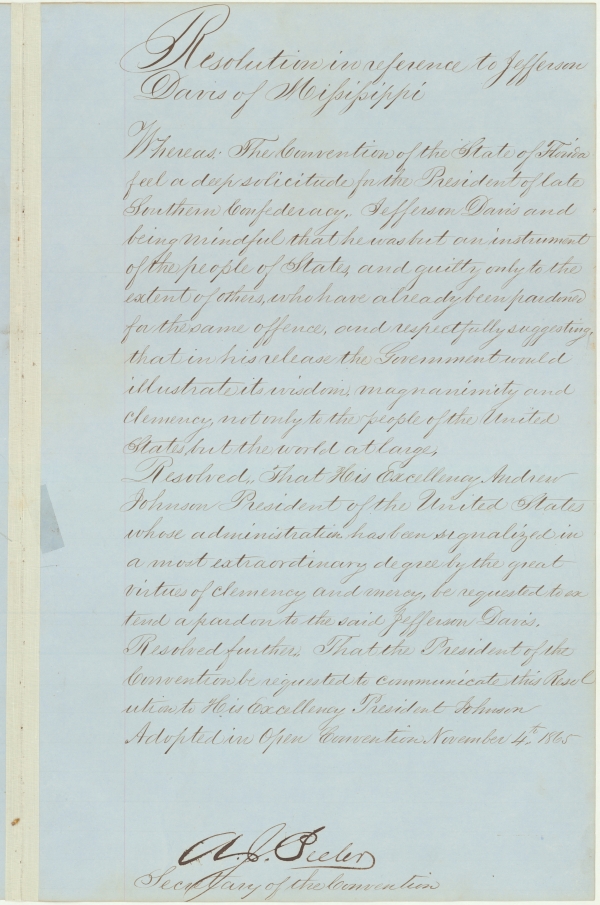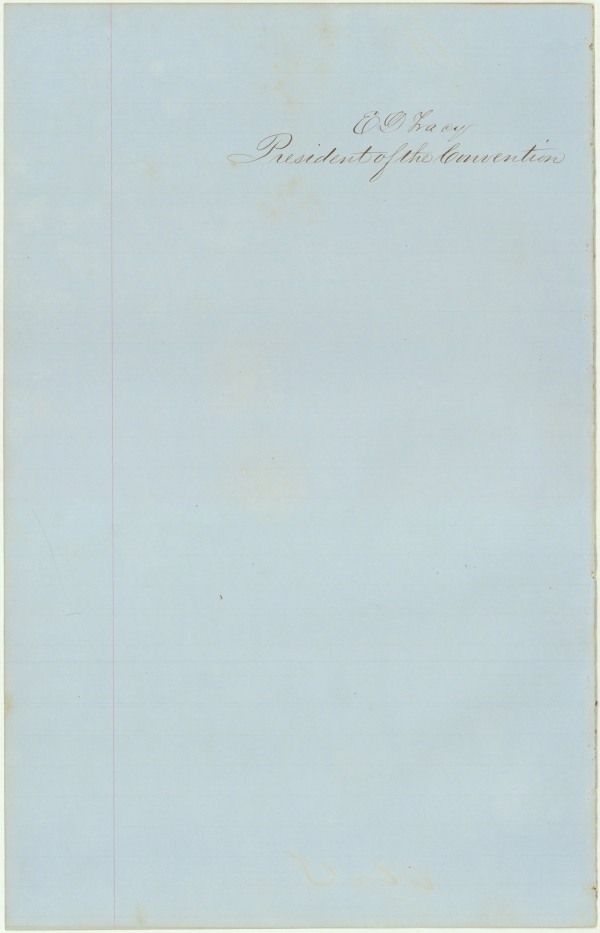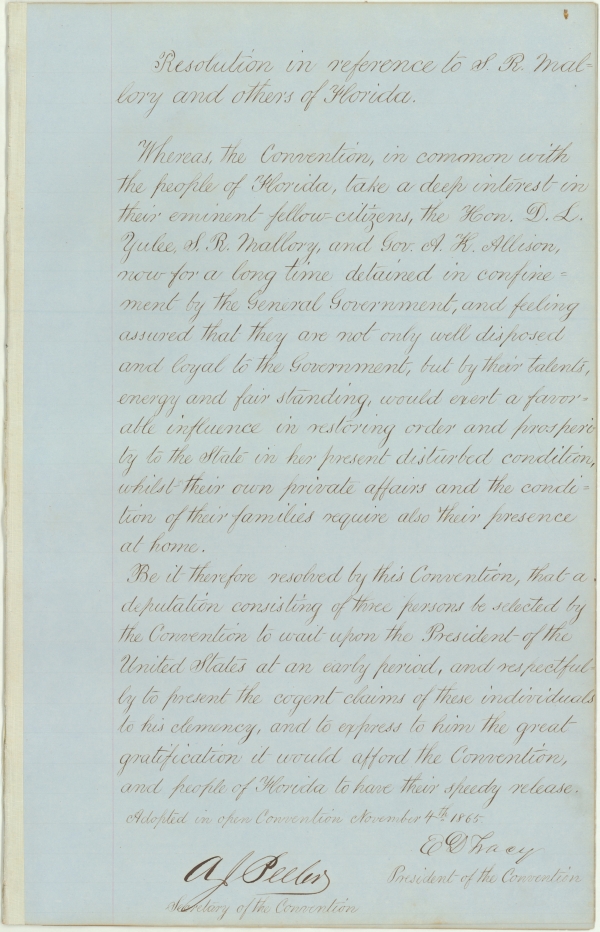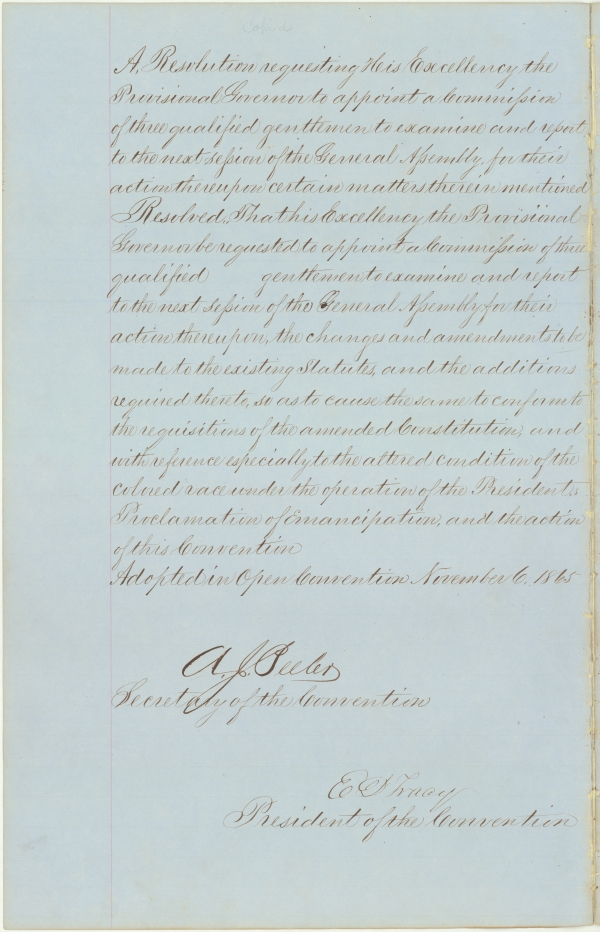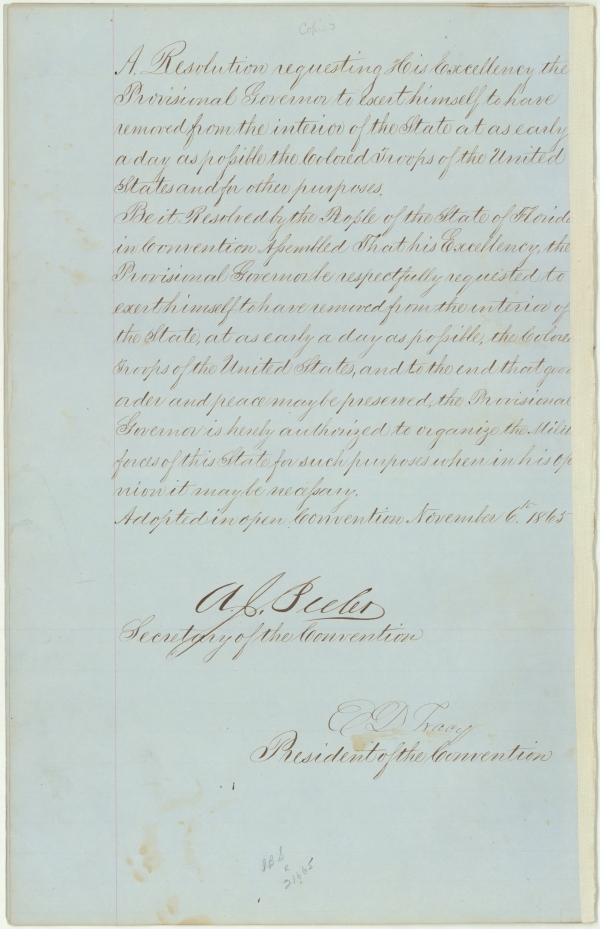Florida Memory is administered by the Florida Department of State, Division of Library and Information Services, Bureau of Archives and Records Management. The digitized records on Florida Memory come from the collections of the State Archives of Florida and the special collections of the State Library of Florida.

State Archives of Florida
- ArchivesFlorida.com
- State Archives Online Catalog
- ArchivesFlorida.com
- ArchivesFlorida.com
State Library of Florida
Related Sites
Description of previous item
Description of next item
Constitution of the State of Florida, 1865
Table of Contents
Article I: Declaration of RightsArticle II: Distribution of the Powers of Government.
Article III: Executive Department
Article IV: Legislative Department
Article V: Judicial Department
Article VI: The Right of Suffrage and Qualifications of Officers; Civil Offices; and Impeachments, and Removals from Office
Article VII: Militia
Article VII: Taxation and Revenue
Article IX: Census and Apportionment of Representation
Article X: Education
Article XI: Public Domain and Internal Improvements
Article XII: Boundaries
Article XIII: Banks and other Corporations
Article XIV: Amendments and Revision of the Constitution
Article XV: Seat of Government
Article XVI: General Provisions
Article XVII: Schedule and Ordinances
[Signatures]
Description
Historical Note
Date
Signers
Baltzell, Thomas, 1804-1866
Magbee, James T.
Bush, A. H.
Maxwell, G. Troup
Callaway, F. B.
May, Asa, 1820-1878
Cooper, W. B.
McLellan, John
Coulter, W. R.
Mickler, James A., Jr.
Davidson, R. H. M. (Robert Hamilton McWhorta), 1832-1908
Niblack, S. L.
Forman, Arthur J.
Overstreet, Silas T., 1830
Bell, Alexander
Owens, James G.
Gettis, James
Richard, John C.
Duncan, W. J. J.
Richards, Jackson N.
Green, James Dopson, 1823-1886
Richardson, Abraham
Hendry, Ardeline Ross Lanier, 1835-1917
Scott, W. Washington
Hines, W. James
Simmons, Moses
Hogue, David Porter
Spencer, S.
Holden, J. W.
Taylor, J. L.
Johnston, James J. P.
Walker, G. K.
Kelly, William W. J., 1814-1878
Whitehurst, D. W.
Landrum, J. M.
Wiggins, James A.
Lassiter, Jesse Brown, 1811-1898
Wright, Benjamin Drake, 1799-1874
Leslie, Felix
Wilson, William
Livingston, Daniel G.
Bird, William Capers, 1835-1892
Long, Thomas T.
Whidden, Wiley W.
Love, James
Williams, S. N.
Peeler, A. J.
Subjects
Constitutional history -- Florida
Constitutional law -- Florida
Constitutions
Florida -- Constitutional Convention -- (1865)
Florida -- Politics and government
Florida. Constitutional Convention (1865)
Public law
Reconstruction (U.S. history, 1865-1877) -- Florida
Geographic Term
Topic
Article II: Distribution of the Powers of Government.
Article III: Executive Department
Article IV: Legislative Department
Article V: Judicial Department
Article VI: The Right of Suffrage and Qualifications of Officers; Civil Offices; and Impeachments, and Removals from Office
Article VII: Militia
Article VII: Taxation and Revenue
Article IX: Census and Apportionment of Representation
Article X: Education
Article XI: Public Domain and Internal Improvements
Article XII: Boundaries
Article XIII: Banks and other Corporations
Article XIV: Amendments and Revision of the Constitution
Article XV: Seat of Government
Article XVI: General Provisions
Article XVII: Schedule and Ordinances
[Signatures]
Section 1. All Militia officers shall be elected or appointed, under such rules and regulations as the General Assembly may from time to time direct and establish.
Section 2. All offenses against the Militia laws shall be tried by Court Martial, or before a court and jury, as the General Assembly may direct.
Section 3. No commission shall be vacated except by sentence of a Court Martial.
ARTICLE VIII.
Taxation and Revenue.
Section 1. The General Assembly shall devise and adopt a system of revenue, having regard to an equal and uniform mode of taxation, throughout the State.
Section 2. No other or greater amount of tax or revenue shall at any time be levied, than may be required for the necessary expenses of the Government.
Section 3. No money shall be drawn from the Treasury but in consequence of an appropriation by law, and a regular statement of the receipts and expenditures of all public monies shall be published and promulgated annually with the laws of the General Assembly.
Title
Subject
Description
Creator
Source
Date
Contributor
Format
Language
Type
Identifier
Coverage
Thumbnail
Transcript
__________
CONSTITUTION or FORM OF GOVERNMENT for the PEOPLE OF FLORIDA
__________
We, the People of the State of Florida, by our delegates in Convention assembled, in the city of Tallahassee, on the 25th day of October, in the year of our Lord 1865, and of the Independence of the United States the 90th year, in order to secure to ourselves and our posterity the enjoyment of all the rights of life, liberty and property, and the pursuit of happiness, do mutually agree, each with the other, to form the following Constitution and form of Government in and for the said State.
__________
ARTICLE I.
Declaration of Rights.
That the great and essential principles of liberty and free government may be recognized and established, we declare:
Section 1. That all freemen when they form a government, have certain inherent and indefeasible rights, among which are those of enjoying and defending life and liberty; of acquiring, possessing and protecting property and reputation, and of pursuing their own happiness.
Section 2. That all political power is inherent in the people, and all free governments are founded on their authority, and established for their benefit; and therefore they have at all times an inalienable and indefeasible right to alter or abolish their form of government in such manner as they may deem expedient.
Section 3. That all men have a natural and inalienable right to worship Almighty God according to the dictates of their own conscience, and that no preference shall ever be given by law to any religious establishment or mode of worship in this State.
Section 4. That no property qualification for eligibility to office, or for the right of suffrage, shall ever be required in this State.
Section 5. That every citizen may freely speak, write and publish his sentiments on all subjects, being responsible for the abuse of that liberty; and no law shall be passed to curtail, abridge or restrain the liberty of speech or of the press.
Section 6. That the right of trial by jury shall forever remain inviolate.
Section 7. That the people shall be secure in their persons, houses, papers and possessions, from unreasonable seizures and searches; and that no warrant to search any place, or to seize any person or thing, shall issue without describing the place to be searched, and the person or thing to be seized, as nearly as may be, nor without probable cause, supported by oath or affirmation.
Section 8. That no freeman shall be taken, imprisoned, or disseized of his freehold, liberties or privileges, or outlawed or exiled, or in any manner destroyed or deprived of his life, liberty or property, but by the law of the land.
Section 9. That courts shall be open, and every person, for an injury done him in his lands, goods, person or reputation, shall have remedy by due course of law; and right and justice administered without sale, denial or delay.
Section 10. That in all criminal prosecutions, the accused hath a right to be heard by himself or counsel, or both; to demand the nature and cause of the accusation; to be confronted with the witnesses against him; to have compulsory process for obtaining witnesses in his favor; and in all prosecutions by indictment or presentment, a speedy and public trial by an impartial jury of the county or district where the offense was committed; and shall not be compelled to give evidence against himself.
Section 11. That all persons shall be bailable by sufficient securities, unless in capital offenses, where the proof is evident, or the presumption
is strong; and the habeas corpus act shall not be suspended unless, when in case of rebellion or invasion, the public safety may require it.
Section 12. That excessive bail shall in no case be required; nor shall excessive fines be imposed; nor shall cruel or unusual punishments be inflicted.
Section 13. That no person shall, for the same offense, be twice put in jeopardy of life and limb.
Section 14. That private property shall not be taken or applied to public use, unless just compensation be first made therefor.
Section 15. That in all prosecutions and indictments for libel, the truth may be given in evidence; and if it shall appear to the jury that the libel is true, and published with good motives, and for justifiable ends, the truth shall be a justification; and the jury shall be the judges of the law and facts.
Section 16. That no person shall be put to answer any criminal charge, but by presentment, indictment or impeachment, except in such cases as the Legislature shall otherwise provide: but the Legislature shall pass no law whereby any person shall be required to answer any criminal charge involving the life of the accused, except upon indictment or presentment by a Grand Jury.
Section 17. That no conviction shall work corruption of blood or forfeiture of
estate.
Section 18. That retrospective laws punishing acts committed before the existence of such laws, and by them only declared penal or criminal, are oppressive, unjust and incompatible with liberty; wherefore no ex post facto law shall ever be made.
Section 19. That no law impairing the obligation of contracts shall be passed.
Section 20. That the people shall have a right, in a peaceable manner, to assemble together to consult for the common good; and to apply to those invested with the powers of government for redress of grievances, or other proper purposes, by petition, address or remonstrance.
Section 21. That no soldier in time of peace shall be quartered in any house without the consent of the owner; nor in time of war but in a manner prescribed by law.
Section 22. That no standing army shall be kept up without the consent of the Legislature; and the military shall be in strict subordination to the civil power.
Section 23. That perpetuities and monopolies are contrary to the genius of a free people, and ought not to be allowed.
Section 24. That no hereditary emoluments, privileges, or honors, shall be granted or conferred in this State.
Section 25. That a frequent recurrence to fundamental principles is absolutely necessary to preserve the blessings of liberty.
Section 26. That, to guard against transgressions upon the rights of the people, we declare that everything in this article is excepted out of the general powers of government, and shall forever remain inviolate; and all laws contrary thereto, or to the following provisions, shall be void.
ARTICLE II.
Distribution of the Powers of Government.
Section 1. The powers of the government of the State of Florida shall be divided into three distinct departments, and each of them confided to a separate body of Magistracy, to-wit: those which are Legislative to one, those which are Executive to another, and those which are Judicial to another.
Section 2. No person or collection of persons, being one of these departments, shall exercise any power properly belonging to either of the others, except in the instance expressly provided in this Constitution.
ARTICLE III.
Executive Department.
Section 1. The Supreme Executive power shall be vested in a Chief Magistrate
, who shall be styled the Governor of the State of Florida.
Section 2. The Governor shall be elected for four years, by the qualified electors, at the time and place they shall vote for representatives, and shall remain in office until a successor shall be chosen and qualified.
Section 3. No person shall be eligible to the office of Governor unless he shall have attained the age of thirty years, shall have been a citizen of the United States ten years, and shall have been a resident of Florida at least five years next preceding his election.
Section 4. There shall be elected at the same time, for the same term and with like qualifications as the Governor, a Lieutenant Governor, who shall be ex-officio President of the Senate, but shall have no vote except in cases of a tie, and during the session of the General Assembly, he shall receive such compensation as shall be allowed to a Senator.
Section 5. The returns of every election for Governor and Lieutenant Governor shall be sealed up and transmitted to the seat of government, directed to the Speaker of the House of Representatives, who shall, during the first week of the session next after their election, open and publish them in the presence of both Houses of the General Assembly; and the persons having the highest number of votes for the respective offices, shall be Governor and Lieutenant Governor; but if two or more shall be equal
and highest in votes for the office of Governor, one of them shall be chosen Governor by the joint vote of the two Houses and in like manner, if two or more shall be equal and highest in votes for the office of Lieutenant Governor, one of them shall be chosen Lieutenant Governor, by the joint vote of the two Houses. And contested elections for Governor and Lieutenant Governor shall be determined by both Houses of the General Assembly, in such manner as shall be prescribed by law.
Section 6. The Governor shall at stated times receive a compensation for his services, which shall not be increased or diminished during the term for which he shall have been elected; but such compensation shall never be less than three thousand dollars per annum.
Section 7. He shall be the Commander-in-Chief of the Army and Navy of this State, and of the Militia thereof.
Section 8. He may require information in writing from the officers of the Executive Department, on any subject relating to the duties of their respective offices.
Section 9. He may by proclamation, on extraordinary occasions, convene the General Assembly at the Seat of Government, or at a different place, if that shall have become dangerous from an enemy or from disease; and in case of disagreement between the two Houses, with respect to the time of adjournment, he may adjourn them to such time as he may think proper, not beyond the day of the next meeting designated by the Constitution.
Section 10. He shall, from time to time, give to the General Assembly information of the state of the Government, and recommend to their consideration such measures as he may deem expedient.
Section 11. He shall take care that the laws be faithfully executed.
Section 12. In all criminal and penal cases, (except of impeachment) after conviction, he shall have power to grant reprieves and pardons, and remit fines and forfeitures, under such rules and regulations as shall be prescribed by law.
Section 13. The State Seal last heretofore used, (until altered by the General Assembly,) shall continue to be the Great Seal of the State, and shall be kept by the Governor for the time being, and used by him officially.
Section 14. All commissions shall be in the name and by the authority of the State of Florida, be sealed with the State Seal, and signed by the Governor and attested by the Secretary of State.
Section 15. There shall be a Secretary of State elected by the qualified electors of the State at the same time, and who shall continue in office for the same term of years as the Governor of the State; and he shall keep a fair register of the official acts and proceedings of the Governor, and shall when required lay the same, and all papers, minutes and vouchers relative thereto, before the General Assembly, and shall perform such other duties as may be required of him by law.
Section 16. Vacancies that happen in offices, the appointment to which is vested in the General Assembly, or given to the Governor, with the advice and consent of the Senate, shall be filled by the Governor during the recess of the General Assembly, by granting commissions which shall expire at the end of the next session.
Section 17. Every bill which shall have passed both Houses of the General Assembly, shall be presented to the Governor; if he approve, he shall sign it; but if not, he shall return it with his objections to the House in which it shall have originated, who shall enter the objections at large upon the journals, and proceed to reconsider it; and if, after such reconsideration, two-thirds of the whole number voting shall agree to pass the bill, it shall be sent with the objections to the other House, by which it shall be reconsidered; and if approved by two-thirds of the whole number voting, it shall become a law: but in such cases the votes of both Houses shall be by yeas and nays, and the names of the members voting for or against the bill shall be entered on the journals of each House respectively; and if any bill shall not be returned by the Governor within five days (Sundays excepted,) after it shall have been presented to him, the same shall be a law in like manner as if he had signed it, unless the General Assembly by their adjournment prevent its return, in which case it shall not be law.
Section 18. Every order, resolution or vote to which the concurrence of both Houses may be necessary, (except on questions of adjournment,) shall
be presented to the Governor, and before it shall take effect, be approved by him, or being disapproved, be re-passed by both Houses, according to the rules and limitations prescribed in case of a bill.
Section 19. In case of the impeachment of the Governor, his removal from office, death, refusal to qualify, resignation, or absence from the State, the Lieutenant Governor shall exercise all the power and authority appertaining to the office of Governor until the Governor absent, or impeached, shall return, or be acquitted, or until the Governor next regularly elected shall be duly qualified, as the case may be; and for the time the Lieutenant Governor shall occupy the office of Governor, he shall receive the same compensation as shall be allowed by law to the regularly elected Governor.
Section 20. In case of the impeachment of both the Governor and the Lieutenant Governor, their removal from office, death, refusal to qualify, resignation, or absence from the State, the Speaker of the House of Representatives shall in like manner administer the Government, unless the General Assembly shall otherwise provide; and for the time he shall occupy the office of Governor, he shall receive the same compensation as shall be allowed by law to the Governor.
Section 21. It shall be the duty of the General Assembly to provide for the purchase or erection of a suitable building for the residence of the Governor, and the Governor shall reside at the seat of government;
but whenever, by reason of danger from an enemy, or from disease, the Governor may deem the capital unsafe, he may, by proclamation, fix the seat of government at some secure place within the State, until such danger shall cease.
Section 22. No person shall hold the office of Governor and any other office or commission, civil or military, either in this State, or under any State, or the United States, or any other power, at one and the same time, except the Lieutenant Governor or the Speaker of the House of Representatives, when he shall hold the office as aforesaid.
Section 23. A State Treasurer and Comptroller of Public Accounts shall be elected by the qualified electors of the State at the same time, and who shall continue in office for the same term of years as the Governor of the State, and until their successors shall have been duly commissioned and qualified.
ARTICLE IV.
Legislative Department.
Section 1. The Legislative power of this State shall be vested in two distinct branches, the one to be styled the Senate, the other the House of Representatives, and both together "The General Assembly of the State of Florida," and the style of the laws shall be, "Be it enacted by the Senate and House of Representatives of the State of Florida in General Assembly convened."
Section 2. The members of the House of Representatives shall be chosen by the qualified voters, and shall serve for the term of two years from the day of the general election, and no longer: and the sessions of the General Assembly shall be annual, and commence on the second Wednesday in November in each year.
Section 3. The Representatives shall be chosen every two years on the first Monday in the month of October, until otherwise directed by law.
Section 4. No person shall be a Representative unless he be a white man, a citizen of the United States, and shall have been an inhabitant of the State two years next preceding his election, and the last year thereof a resident of the County for which he shall be chosen, and shall have attained the age of twenty-one years.
Section 5. The Senators shall be chosen by the qualified electors for the term of two years, at the same time, in the same manner, and at the same places where they vote for members of the House of Representatives; and no man shall be a Senator unless he be a white man, a citizen of the United States, and shall have been an inhabitant of this State two years next preceding his election, and the last year thereof a resident of the District or County for which he shall be chosen, and shall have attained the age of twenty-five years.
Section 6. The House of Representatives, when assembled, shall choose
a Speaker and its other officers, and the Senate, its other officers, and in the absence of the Lieutenant Governor, a President pro tempore, and each House shall be judge of the qualifications, elections, and returns of its members; but a contested election shall be determined in such manner as shall be directed by law.
Section 7. A majority of each House shall constitute a quorum to do business, but a smaller number may adjourn from day to day, and may compel the attendance of absent members, in such manner and under such penalties as each House may prescribe.
Section 8. Each House may determine the rules of its own proceedings, punish its members for disorderly behavior, and with the consent of two-thirds, expel a member, but not a second time for the same cause.
Section 9. Each House, during the session, may punish, by imprisonment, any person not a member, for disrespectful or disorderly behavior in its presence, or for obstructing any of its proceedings, provided, such imprisonment shall not extend beyond the end of the session.
Section 10. Each House shall keep a Journal of its proceedings, and cause the same to be published immediately after its adjournment; and the yeas and nays of the members of each House shall be taken and entered upon the Journals upon the final passage of every bill, and may, by any two members, be required upon any other question; and any member of either House shall have liberty to dissent from, or protest against, any act or resolution which he may think injurious to the public, or an individual, and have the reasons of
his dissent entered on the journal.
Section 11. Senators and Representatives shall in all cases, except of treason, felony, or breach of the peace, be privileged from arrest during the session of the General Assembly, and in going to, or returning from the same, allowing one day for every twenty miles such member may reside from the place at which the General Assembly is convened, and for any speech or debate in either House they shall not be questioned in any other place.
Section 12. The General Assembly shall make provision by law, for filling vacancies that may occur in either House by the death, resignation, (or otherwise) of any of its members.
Section 13. The doors of each House shall be open when in legislative session, except on such occasions as, in the opinion of the House, the public safety may imperiously require secrecy.
Section 14. Neither House shall, without the consent of the other, adjourn for more than three days, nor to any other place than that in which they may be sitting.
Section 15. Bills may originate in either House of the General Assembly; and all bills passed by one House may be discussed, amended or rejected by the other; but no bill shall have the force of law, until on three several days it be read in each House and free discussion be allowed thereon, unless in cases of urgency, four-fifths of the House in which the same shall be depending, may deem it expedient
to dispense with the rule; and every bill having passed both Houses, shall be signed by the Speaker and President of their respective Houses.
Section 16. Each member of the General Assembly shall receive from the public Treasury such compensation for his services as may be fixed by law; but no increase of compensation shall take effect during the term for which the Representatives were elected, when such law passed.
Section 17. The sessions of the General Assembly shall not extend in duration over thirty days, unless it be deemed expedient by a concurrent majority of two-thirds of the members of each House; and no member shall receive pay from the State for his services after the expiration of sixty days continuously from the commencement of the session.
Section 18. The General Assembly shall by law authorize the Circuit Court to grant licenses for building Toll-Bridges, and to establish Ferries, and to regulate the tolls of both; to construct dams across streams not navigable; to ascertain and declare what streams are navigable; but no special law for such purpose shall be made.
Section 19. The General Assembly shall pass a general law prescribing the manner in which names of persons may be changed, but no special law for such purpose shall be passed; and no law shall be made allowing minors to contract, or manage their estates.
Section 20. The General Assembly shall pass a general law for the incorporation of Towns, Religious, Literary, Scientific, Benevolent, Military and other Associations, not Commercial, Industrial or Financial; but no special act incorporating any such association shall be passed.
Section 21 . No act incorporating any Railroad, Banking, Insurance, Commercial or Financial corporation shall be introduced into the General Assembly, unless the person or persons applying for such corporation shall have deposited with the Treasurer the sum of one hundred dollars as a bonus to the State.
Section 22. Officers shall be removed from office for incapacity, misconduct or neglect of duty, in such manner as may be provided by law, when no mode of trial or removal is provided in this Constitution.
ARTICLE V.
Judicial Department.
Section 1. The Judicial power of this State, both as to matters of law and equity, shall be vested in a Supreme Court, Courts of Chancery, Circuit Courts, and Justices of the Peace, provided the General Assembly may also vest such civil or criminal jurisdiction as may be necessary in Corporation Courts, and such other courts as the General Assembly may establish; but such jurisdiction shall not extend to capital cases.
Section 2. The Supreme Court, except in cases otherwise directed in this Constitution, shall have appellate jurisdiction only, which shall be co-extensive with the State, under such restrictions and regulations, not repugnant to this Constitution, as may from time to time be prescribed by law, provided that the said court shall always have power to issue writs of injunction, mandamus, quo warranto, habeas corpus, and such other original and remedial writs as may be necessary to give it a general superintendence and control of all other courts.
Section 3. The Supreme Court shall be holden at such times and places as may be prescribed by law; and two Judges of the Circuit Court may be added to the Supreme Court, when in session, at the discretion of the Legislature; and the court so composed shall constitute the Supreme Court of the State, when the Legislature shall so direct.
Section 4. The State shall be divided into convenient Circuits; and for each Circuit there shall be a Judge, who shall, after his election or appointment, reside in the Circuit for which he has been elected or appointed; and shall, as well as Justices of the Supreme Court, receive for his services a salary of not less than twenty-five hundred dollars per annum, which shall not be diminished during his continuance in office; but the Judges shall receive no fees, perquisites of office, nor hold any other office of profit under the State, the United States, or any other power.
Section 5. The Circuit Courts shall have original jurisdiction in all matters, civil and criminal, not otherwise excepted in this Constitution.
Section 6. A Circuit Court shall be held in such counties and at such times and places therein, as may be prescribed by law; and the Judges of the several Circuit Courts may hold courts for each other, either for the entire Circuit or for a portion thereof, and they shall do so when required, by order of the Governor or Chief Justice of the Supreme Court; and they may exercise jurisdiction in cases of writs of habeas corpus in any Judicial Circuit in which the Judge may happen to be at the time the case arises.
Section 7. The General Assembly shall have power to establish and organize a separate court or courts of original equity jurisdiction; but until such court or courts shall be established and organized, the Circuit Courts shall exercise such jurisdiction.
Section 8. There shall be elected in each county of this State, by the qualified voters, an officer to be styled the Judge of Probate, to take probate of wills, to grant letters testamentary, of administration and guardianship, to attend to the settlement of the estates of decedents and minors, and to discharge the duties usually appertaining to Courts of Ordinary, and such other duties as may be required by law; subject to the direction and supervision of the Circuit Courts, as may be provided by law.
Section 9 . A competent number of Justices of the Peace shall be from time to time elected in and for each county, in such mode and for such term of office as the General Assembly may direct, and shall possess such jurisdiction as may be prescribed by law; and in cases tried before a Justice of the Peace, the right of appeal shall
be secured under such rules and regulations as may be prescribed by law.
Section 10. There shall be appointed by the Governor, by and with the advice and consent of the Senate, a Chief Justice and two associate Justices of the Supreme Court of this State, who shall reside in this State, and hold their office for the term of six years from their appointment and confirmation, unless sooner removed under the provisions of this Constitution, for the removal of Judges by address or impeachment: and for wilful neglect of duty or other reasonable cause, which shall not be sufficient ground for impeachment, the Governor shall remove any of them on the address of two-thirds of the General Assembly: Provided, however, That the cause or causes shall be notified to the Judge so intended to be removed, and he shall be admitted to a hearing in his own defense, before any vote for such removal shall pass, and in such case, the vote shall be taken by yeas and nays, and entered on the journal of each House respectively, and in case of the appointment to fill a vacancy in said offices, the person so appointed shall only hold the office for the unexpired term of his predecessor.
Section 11. There shall be elected, at the time and places prescribed by law, by the qualified electors of each of the respective Judicial Circuits of this State, one Judge of the Circuit Court, who shall reside in the Circuit for which he may be elected, and the said Circuit Judges shall continue in office for the term of six years from the date of their respective elections, unless sooner removed, under the provisions in this Constitution for the removal of Judges by address or
impeachment; and for wilful neglect of duty, or other reasonable cause, which shall not be sufficient for impeachment, the Governor shall remove any of them, on the address of two-thirds of the General Assembly: Provided, however, That the cause or causes shall be stated at length in such address and entered on the journals of each House: And provided, further, That the cause or causes shall be notified to such Judge so intended to be removed, and he shall be admitted to a hearing in his own defense before any vote or votes for such removal shall pass; and in such cases the vote shall be taken by yeas and nays and entered on the journals of each House respectively.
Section 12. The appointment of Chief Justice and Associate Justices of the Supreme Court shall be made every sixth year after their first appointment, and the election of Judges of the Circuit Court, and Judges or Chancellors of the Chancery Court, when established, shall be held in every sixth year after their first elections, at the same time and places as the elections for members of the General Assembly.
Section 13. That whenever the General Assembly shall create a Chancery Court, under the provisions of this Constitution, the Judges thereof shall be elected in the manner provided in the last two sections of this article, and shall hold their offices and be subject to all the provisions of said sections: Provided, however, That the said Judges shall be elected by general ticket or by districts, as the General Assembly may direct.
Section 14. That should a vacancy occur either in the Chancery or Circuit Courts, by death, removal, resignation or otherwise, it shall be the duty of the Governor to issue a writ of election to fill such vacancy, and he shall give at least sixty days notice thereof by proclamation: and the Judge so elected to fill said vacancy shall continue in office from the time he qualifies under his commission, until the expiration of the term of his predecessor: Provided, however, That should it become necessary to fill any such vacancy before an election can be held under the provisions of this Constitution, the Governor shall have power to fill such vacancy by appointment, and the person so appointed shall hold his office from the date of his commission until his successor shall be duly elected and qualified.
Section 15. The Clerks of the Circuit Courts of the several Circuits of this State, shall be elected by the qualified voters in their several counties at such times and places as are now or may be provided by law: Provided, however, That the Chief Justice of the Supreme Court and the Chancellors of the Court of Chancery, when such courts shall be established, shall have the power to appoint the Clerks of their respective courts.
Section 16. The Justices of the Supreme Court, Chancellors and Judges of the Circuit Courts, shall, by virtue of their offices, be conservators of the peace throughout the State.
Section 17. The style of all process shall be "The State of Florida," and all criminal prosecutions shall be carried on in the name of
the State, and all indictments shall conclude, "against the peace and dignity of the same."
Section 18. There shall be an Attorney General for the State, who shall reside at the seat of government, and he shall perform such duties as may be prescribed by law; he shall be elected by the qualified voters of the State, at the same time and in the same manner that the Comptroller, Secretary of State and Treasurer are elected, and his term of office shall be the same; but he may be removed by the Governor, on the address of a majority of the two Houses of the General Assembly, and shall receive for his services a compensation to be fixed by law.
Section 19. There shall be one Solicitor for each Circuit, who shall reside therein, to be elected by the qualified electors of the Circuit, who shall hold his office for the term of four years, and shall receive for his services a compensation to be fixed by law.
Section 20. No Justice of the Supreme Court shall sit as a Judge, or take part in the Appellate Court on the trial or hearing of any case which shall have been decided by him in the Court below.
Section 21. The General Assembly shall have power to establish in each county a Board of Commissioners, for the regulation of the county business therein.
Section 22. No duty not judicial shall be imposed by law upon the Justices of the Supreme Court, Chancellors or the Judges of the Circuit
Courts of this State, except in cases otherwise provided for in this Constitution.
ARTICLE VI.
The Right of Suffrage and Qualifications of Officers, Civil Officers, and Impeachments, and Removals from Office.
Section 1. Every free white male person of the age of twenty-one years and upwards, and who shall be, at the time of offering to vote, a citizen of the United States, and who shall have resided and had his habitation, domicil, home, and place of permanent abode in Florida, for one year next preceding the election at which he shall offer to vote, and who shall, at such time, and for six months immediately preceding said time, have had his habitation, domicil, and place of permanent abode in the county in which he may offer to vote, shall be deemed a qualified elector at all elections under the Constitution, and none others; except in elections by general ticket in the State or District prescribed by law, in which cases the elector must have been a resident of the State one year next preceding the election, and six months within the elective district in which he offers to vote: Provided, That no officer, soldier, seaman or marine, in the regular army or navy of the United States, or any other person in the employ or pay of the United States, unless he be a qualified elector of the State previous to his appointment or enlistment as such officer, soldier, seaman or marine, in the regular army or navy of the United States, or of the revenue service,
shall be considered a resident of the State in consequence of being stationed within the same.
Section 2. The General Assembly shall have power to exclude from every office of honor, trust, or profit within the State, and from the right of suffrage, all persons convicted of bribery, perjury or other infamous crime.
Section 3. No person shall be capable of holding or being elected to any post of honor, profit, trust or emolument, civil or military, legislative, executive or judicial, under the government of this State, who shall hereafter fight a duel, or send or accept a challenge to fight a duel, the probable issue of which may be the death of the challenger or challenged, or who shall be a second to either party, or who shall, in any manner, aid or assist in such duel, or shall be knowingly the bearer of such challenge or acceptance, whether the same occur or be committed in or out of the State; but the legal disability shall not accrue until after trial and conviction, according to due form of law.
Section 4. No person who may hereafter be a collector or holder of public monies shall have a seat in either House of the General Assembly, or be eligible to any office of trust or profit under this State, until he shall have accounted for and paid into the Treasury all sums for which he may be accountable.
Section 5. No Governor, member of Congress, or of the General Assembly of this State, shall receive a fee, be engaged as counsel, agent
or attorney, in any civil case or claim against this State, or to which this State shall be a party, during the time he shall remain in office.
Section 6. No Senator or Representative shall, during the term for which he shall have been elected, be appointed to any civil office of profit under this State, which shall have been created, or the emoluments of which shall have been increased, during such term, except such offices as may be filled by elections by the people.
Section 7. Members of the General Assembly, and all officers, civil or military, before they enter upon the execution of their respective offices, shall take the following oath or affirmation: "I do swear (or affirm) that I am duly qualified, according to the Constitution of this State, to exercise the office to which I have been elected (or appointed,) and will, to the best of my abilities, discharge the duties thereof, and preserve, protect and defend the Constitution of this State and of the United States of America."
Section 8. Every person shall be disqualified from serving as Governor, Senator, Representative, or from holding any other office of honor or profit in this State, for the term for which he shall have been elected, who shall have been convicted of having given or offered any bribe to procure his election.
Section 9. Laws shall be made by the General Assembly to exclude from office, and from suffrage, those who shall have been, or
may hereafter be convicted of bribery, perjury, forgery, or other high crime or misdemeanor; and the privilege of suffrage shall be supported by laws regulating elections and prohibiting, under adequate penalties, all undue influence thereon, from power, bribery, tumult, or other improper practices.
Section 10. All civil officers of the State at large shall reside within the State, and all district or county officers within their respective districts or counties, and shall keep their respective offices at such places therein as may be required by law.
Section 11. It shall be the duty of the General Assembly to regulate by law in what cases and what deduction from the salaries of public officers shall be made, for any neglect of duty in their official capacity.
Section 12. Returns of elections for members of Congress and the General Assembly shall be made to the Secretary of State, in manner to be prescribed by law.
Section 13. In all elections by the General Assembly the vote shall be viva voce, and in all elections by the people the vote shall be by ballot.
Section 14. No member of Congress or person holding or exercising any office of profit under the United States, or under any foreign power, shall be eligible as a member of the General Assembly of this State, or hold or exercise any office of profit under the State; and
no person in this State shall ever hold two offices of profit at the same time, except the office of Justice of the Peace, Notary Public, Constable, and Militia offices, except by special act of the Legislature; but the Legislature shall never unite in the same person two offices, the duties of which are incompatible.
Section 15. The General Assembly shall, by law, provide for the appointment or election, and removal from office, of all officers, civil and military, in this state, not provided for in this Constitution.
Section 16. The power of impeachment shall be vested in the House of Representatives.
Section 17. All impeachments shall be tried by the Senate; when sitting for that purpose the Senators shall be upon oath or affirmation; and no person shall be convicted without the concurrence of two-thirds of the members present.
Section 18. The Governor and all civil officers shall be liable to impeachment for any misdemeanor in office, but judgment in such cases shall not extend further than to removal from office and disqualification to hold any office of honor, trust or profit under this State; but the parties nevertheless shall be liable to indictment, trial and punishment according to law.
ARTICLE VII.
Militia.
Section 1. All Militia officers shall be elected or appointed, under such rules and regulations as the General Assembly may from time to time direct and establish.
Section 2. All offenses against the Militia laws shall be tried by Court Martial, or before a court and jury, as the General Assembly may direct.
Section 3. No commission shall be vacated except by sentence of a Court Martial.
ARTICLE VIII.
Taxation and Revenue.
Section 1. The General Assembly shall devise and adopt a system of revenue, having regard to an equal and uniform mode of taxation, throughout the State.
Section 2. No other or greater amount of tax or revenue shall at any time be levied, than may be required for the necessary expenses of the Government.
Section 3. No money shall be drawn from the Treasury but in consequence of an appropriation by law, and a regular statement of the receipts and expenditures of all public monies shall be published and promulgated annually with the laws of the General Assembly.
Section 4. The General Assembly shall have power to authorize the several counties and incorporated towns in this state to impose taxes for county and corporation purposes, respectively, and all property shall be taxed upon the principles established in regard to State taxation.
Section 5. The General Assembly shall have power to authorize the levying of a capitation tax.
ARTICLE IX.
Census and Apportionment of Representation.
Section 1. The General Assembly shall, in the year one thousand eight hundred and sixty-seven, and in the year one thousand eight hundred and seventy-five, and every tenth year thereafter, cause an enumeration to be made of all the inhabitants of the State; and to the whole number of white inhabitants shall be added three-fifths of the number of colored people; and they shall then proceed to apportion the representation equally among the different counties, according to such enumeration, giving, however, one representative to every county, and increasing the number of representatives on a uniform ratio of population, according to the foregoing basis, and which ratio shall not be changed until a new census shall have been taken.
Section 2. The General Assembly shall also, after every such enumeration,
proceed to fix by law the number of Senators which shall constitute the Senate of the State of Florida, and which shall never be less than one-fourth nor more than one-half of the whole number of the House of Representatives; and they shall lay off the State into the same number of Senatorial Districts, as nearly equal in the number of inhabitants as may be, according to the ratio of representation established in the preceding section, each of which districts shall be entitled to one Senator.
Section 3. When any Senatorial District shall be composed of two or more counties, the counties of which such district consists shall not be entirely separated by any county belonging to another district, and no county shall be divided in forming a district.
Section 4. No county now organized shall be divided into new counties, so as to reduce the inhabitants of either below the ratio of representation.
Section 5. The several counties of this State shall be entitled to the following Representatives, viz: Escambia three, Santa Rosa two, Walton two, Holmes one, Washington one, Calhoun one, Franklin one, Jackson four, Gadsden three, Leon four, Wakulla one, Liberty one, Jefferson three, Madison two, Hamilton two, Lafayette one, Taylor one, Suwannee one, Columbia two, Baker one, Bradford one, Alachua two, Nassau one, Duval two, Clay one, St. Johns one, Putnam one, Marion two, Sumter one, Orange one, Volusia one, Brevard one, Levy one, Hernando one, Hillsborough one, Manatee one, Monroe one, Dade
the Twenty-Sixth District; the counties of Hillsborough and Manatee shall compose the Twenty-Seventh District; the counties of Polk and Brevard shall compose the Twenty-Eighth District; and the counties of Monroe and Dade shall compose the Twenty-Ninth District; and each Senatorial District shall be entitled to one Senator.
ARTICLE X.
Education.
Section 1. The proceeds of all lands for the use of Schools and a Seminary or Seminaries of Learning shall be and remain a perpetual fund, the interest of which, together with all monies accrued from any other source, applicable to the same object, shall be inviolably appropriated to the use of Schools and Seminaries of Learning, respectively, and to no other purpose.
Section 2. The General Assembly shall take such measures as may be necessary to preserve from waste or damage all lands so granted and appropriated for the purpose of Education.
ARTICLE XI.
Public Domain and Internal Improvement.
Section 1. It shall be the duty of the General Assembly to provide for the
prevention of waste and damage of the public lands, that may hereafter be ceded to the State of Florida, and it may pass laws for the sale of any part or portion thereof; and, in such cases, provide for the safety, security and appropriation of the proceeds, but in no wise to affect the purposes for which said lands have heretofore been appropriated.
Section 2. A liberal system of Internal Improvements being essential to the development of the resources of the State, shall be encouraged by the government of this State; and it shall be the duty of the General Assembly, as soon as practicable, to ascertain by law proper objects for the extension of Internal Improvements, in relation to roads, canals and navigable streams, and to provide for a suitable application of such funds as may have been, or may hereafter be appropriated by said General Assembly for such improvements.
Section 3. That the General Assembly may at any time cede to the United State Government a sufficient parcel or fraction of land for the purpose of coast defense and other national purposes.
ARTICLE XII.
Boundaries.
Section 1. The boundary of the State of Florida shall be as follows: commencing at the mouth of the river Perdido, from
thence up the middle of said river to where it intersects the southern boundary line of the State of Alabama, on the thirty-first degree of North latitude; then due East to the Chattahoochee river; thence down the middle of said river to its confluence with the Flint river;
from thence straight to the head of the St. Marys river; thence down the middle of said river to the Atlantic Ocean; thence southwardly to the Gulf of Florida and Gulf of Mexico; thence northwardly and westwardly, including all islands within five leagues of the shore, to the beginning.
ARTICLE XIII.
Banks and Other Corporations.
Section 1. The General Assembly shall pass no act of incorporation, nor make any alteration in one, unless with the assent of at least two-thirds of each House, and unless public notice in one or more newspapers in the State shall have been given for at least three months immediately preceding the session at which the same may be applied for.
Section 2. No bank charter, nor any act of incorporation granting exclusive privileges, shall be granted for a longer period than twenty years.
Section 3. Banks chartered by the General Assembly shall be restricted to the business of exchange, discount and deposit, and
they shall not deal in real estate, nor in merchandise nor chattels, except as security for loans or discounts, or for debts due to such bank; nor shall they be concerned in insurance, manufacturing, exportation, or importation, except of bullion, or specie; nor shall they own real estate or chattels, except such as shall be necessary for their actual use in the transaction of business, or which may be received in payment of previously contracted debts, or purchased at legal sales to satisfy such debts, of which they shall be required to make sale within three years after the acquisition thereof.
Section 4. The capital stock of any bank shall not be less than one hundred thousand dollars, to be paid in suitable instalments, and shall be created only by the payment of specie therein.
Section 5. All liabilities of such banks shall be payable in specie, and the circulation of no bank shall exceed three dollars for one of capital actually paid in.
Section 6. No dividends or profits exceeding ten per centum per annum on the capital stock paid in shall be made; but all profits over ten per centum per annum shall be set apart and retained as a safety fund.
Section 7. Stockholders in a bank, when an act of forfeiture is committed, or when it is dissolved or has expired, shall be individually and severally liable for the redemption of the outstanding circulation, in proportion to the stock owned by each,
and no transfer of stock shall exonerate such stockholders from this liability, unless such transfer was made at least two years previous to said forfeiture, dissolution or expiration.
Section 8. Banks shall be open to inspection under such regulations as may be prescribed by law, and it shall be the duty of the Governor to appoint a person or persons not connected in any manner with any bank in the State, to examine at least once a year into their state and condition; and the officers of every bank shall make quarterly returns under oath, to the Governor, of its state and condition, and the names of the stockholders, and shares held by each.
Section 9. Non user for the space of one year, or any act of a corporation, or those having the control or management thereof, or intrusted therewith, inconsistent with, or in violation of the provisions of this Constitution, or of its charter, shall cause its forfeiture, and the General Assembly shall by general law provide a summary process for the sequestration of its effects and assets, and the appointment of officers to settle its affairs, and no forfeited charter shall be restored.
Section 10. The General Assembly shall not pledge the faith and credit of the State to raise funds in the aid of any corporation whatever.
ARTICLE XIV.
Amendments and Revisions of the Constitution.
Section 1. No part of this Constitution shall be altered except by a Convention duly elected.
Section 2. No Convention of the people shall be called unless by the concurrence of two-thirds of all the members of each House of the General Assembly, made known by the passing of a bill, which shall be read three times on three several days in each House.
Section 3. Whenever a Convention shall be called, proclamation of an election for Delegates shall be made by the Governor at least thirty days before the day of election. Every County and Senatorial District shall be entitled to as many Delegates as it has representatives in the General Assembly. The same qualifications shall be required in Delegates, and in Electors, that are required in members of the General Assembly, and voters for the same respectively, and the elections for Delegates to a Convention, and the returns of such election, shall be held and made in the manner prescribed by law for regulating elections for members of the General Assembly, but the Convention shall judge of the qualifications of its members.
ARTICLE XV.
Seat of Government.
The Seat of Government shall be and remain permanent at the City of Tallahassee, until otherwise provided for by the action of a Convention of the people of the State.
ARTICLE XVI.
General Provisions.
Section 1. Whereas, slavery has been destroyed in this State by the Government of the United States; therefore, neither slavery nor involuntary servitude shall in future exist in this State, except as a punishment for crimes, whereof the party shall have been convicted by the courts of the State, and all the inhabitants of the State, without distinction of color, are free, and shall enjoy the rights of person and property without distinction of color.
Section 2. In all criminal proceedings founded upon injury to a colored person, and in all cases affecting the rights and remedies of colored persons, no person shall be incompetent to testify as a witness on account of color; in all other cases, the testimony of colored persons shall be excluded, unless made competent by future legislation. The jury shall judge
the credibility of the testimony.
Section 3. The Jurors of this State shall be white men, possessed of such qualifications as may be prescribed by law.
Section 4. Treason against the State shall consist only in levying war against it, or in adhering to its enemies, giving them aid and comfort. No person shall be convicted of treason unless on the testimony of two witnesses to the same overt act, or his confession in open court.
Section 5. Divorces from the bonds of matrimony shall not be allowed but by the judgment of a court, as shall be prescribed by law.
Section 6. The General Assembly shall declare by law what parts of the common law, and what parts of the civil law, not inconsistent with this Constitution, shall be in force in this State.
Section 7. The oaths of officers directed to be taken under this Constitution, may be administered by any judge, or justice of the peace, in the State of Florida, until otherwise provided by law.
ARTICLE XVII.
Schedule and Ordinance.
Section 1. All the laws of the State passed during and since the tenth session of the Legislature thereof, in 1860, not repugnant to the Constitution of this State, or of the United States, shall be valid; all writs, actions, prosecutions, judgments and decrees, of the courts of the State, all executions and sales made thereunder, and all acts, orders and proceedings of the Judges of Probate, and of Executors, Administrators, Guardians and Trustees, provided they were in conformity to the laws then in force, and not fraudulent, shall be as valid as if made under the usual and ordinary legislation of the country, provided that the same be not repugnant to the Constitution of the state and of the United States.
Section 2. All fines, penalties, forfeitures, obligations and escheats, heretofore accruing to the State of Florida, and not made unlawful by the Constitution or laws of the United States, shall continue to accrue to the use of the State.
Section 3. All recognizances heretofore taken shall remain valid, and all bonds executed to the Governor of the State of Florida, either before or since the first day of January, 1861, or to any other officer of the State in his official capacity, shall be of full force and virtue for the uses herein respectively expressed, and may be sued for and recovered accordingly; and all criminal prosecution and penal actions which have arisen may be prosecuted
to judgment and execution in the name of the State.
Section 4. The Provisional Governor of this State is hereby requested to authorize the civil officers of this State who were discharging the duties of their offices prior to, or during the month of May, A. D. 1865, to resume the exercise of the functions of their respective offices, and to make such other appointments to office as may be necessary or proper to reorganize or re-establish the civil government of this State; and all actions at law, or suits in chancery, or any proceeding pending in any of the courts of this State, prior to, or during the said month of May, 1865, and either before or subsequent to the 10th day of January, A. D. 1861, shall continue in all respects valid, and may be prosecuted to judgment and decree: and all judgments and decrees rendered in civil causes in any of the courts in this State during the period of time last above specified, and not repugnant to the constitution of the United States, are hereby declared of full force, validity and effect.
Section 5. The Provisional Governor of the State is hereby requested and authorized, at as early a day as practicable, to issue writs of election to the proper officers in the different counties in this State, and make proclamation for an election for Governor, Lieutenant Governor, Secretary of State, Treasurer, Comptroller of Public Accounts, Attorney General, Circuit Judges, Judges of Probate, Sheriffs, Clerks of Circuit Courts, Solicitors, Representative in Congress, Senators and Representatives of the General Assembly, County Commissioners, Coroners, Justices of the Peace, County Surveyors, and all other officers provided for by this Constitution. The said election shall be held on the 29th day of November, A. D. 1865. The
said election shall be conducted according to the existing laws of the State of Florida, and shall take place on the same day throughout the State, the returns to be made according to law. The members of the General Assembly so elected shall assemble on the 3d Monday in December, A. D. 1865. The Governor, Lieutenant Governor, Secretary of State, Treasurer, Comptroller of Public Accounts, Attorney General, Circuit Judges, Judges of Probate, Sheriffs, Clerks of Circuit Courts, Solicitors, Representative in Congress, Senators and Representatives of the General Assembly, County Commissioners, Coroners, Justices of the Peace, County Surveyors and all other officers provided for by this Constitution, shall enter upon the duties of their respective offices immediately after their election, and shall continue in office in the same manner and during the same period they would have done had they been elected on the first Monday in October, A. D. 1865. The Representative in Congress shall continue in office in the same manner and during the same period he would have done, had he been elected on the first Monday in October, A. D. 1865.
Section 6. The Statutes of Limitation shall not be pleaded upon any claim in the hands of any person whomsoever, not sued upon when such claim was not barred by the Statutes of Limitation on the 10th day of January, A. D. 1861.
Section 7. No law of this State providing that claims or demands against the estates of decedents shall be barred if not presented within two years, shall be considered as being in force within this State between the 10th day of January, 1861, and the 25th day of October, 1865.
Done in open Convention. In witness whereof, the undersigned, the President of said Convention, and Delegates present, representing the people of Florida, do hereby sign our names, this the seventh day of November, Anno Domini, Eighteen Hundred and Sixty-five, and of the Independence of the United States of America the ninetieth year, and the Secretary of said Convention doth countersign the same.
E. D. TRACY, President
Thomas Baltzell, James T. Magbee, A. H. Bush, G. Troup Maxwell, F. B. Callaway, Asa May, W. B. Cooper, John McLellan, W. R. Coulter, James A. Mickler, Jr. R. H. M. Davidson, S. L. Niblack, Arthur J. Forman Silas T. Overstreet, Alexander Bell James G. Owens, James Gettis John C. Richard, W. J. J. Duncan, Jackson N. Richards, Jas. D. Green, A. Richardson, Francis A. Hendry, W. Wash. Scott, W. Jas. Hines, Moses Simmons, D. P. Hogue, S. Spencer, J. W. H. Holden, J. L. Taylor, Jas. F. P. Johnston, G. K. Walker, Wm. W. J. Kelly, D. W. Whitehurst, J. M. Landrum, James A. Wiggins, Jesse B. Lassiter, B. D. Wright, Felix Leslie, Wm. Wilson, Dan'l. G. Livingston, Wm. Capers Bird, Thos. T. Long, Wiley W. Whidden, James Love, S. N. Williams,
A. J. PEELER, Secretary.
ImageID
toc
Article II: Distribution of the Powers of Government.
Article III: Executive Department
Article IV: Legislative Department
Article V: Judicial Department
Article VI: The Right of Suffrage and Qualifications of Officers; Civil Offices; and Impeachments, and Removals from Office
Article VII: Militia
Article VII: Taxation and Revenue
Article IX: Census and Apportionment of Representation
Article X: Education
Article XI: Public Domain and Internal Improvements
Article XII: Boundaries
Article XIII: Banks and other Corporations
Article XIV: Amendments and Revision of the Constitution
Article XV: Seat of Government
Article XVI: General Provisions
Article XVII: Schedule and Ordinances
[Signatures]
General Note
Geographic Term
Subject - Corporate
topic
Chicago Manual of Style
Florida. Constitutional Convention (1865). Constitution of the State of Florida, 1865. 1865-11-07. State Archives of Florida, Florida Memory. <https://www.floridamemory.com/items/show/189093>, accessed 28 November 2024.
MLA
Florida. Constitutional Convention (1865). Constitution of the State of Florida, 1865. 1865-11-07. State Archives of Florida, Florida Memory. Accessed 28 Nov. 2024.<https://www.floridamemory.com/items/show/189093>
AP Style Photo Citation
(State Archives of Florida/Florida. Constitutional Convention (1865))
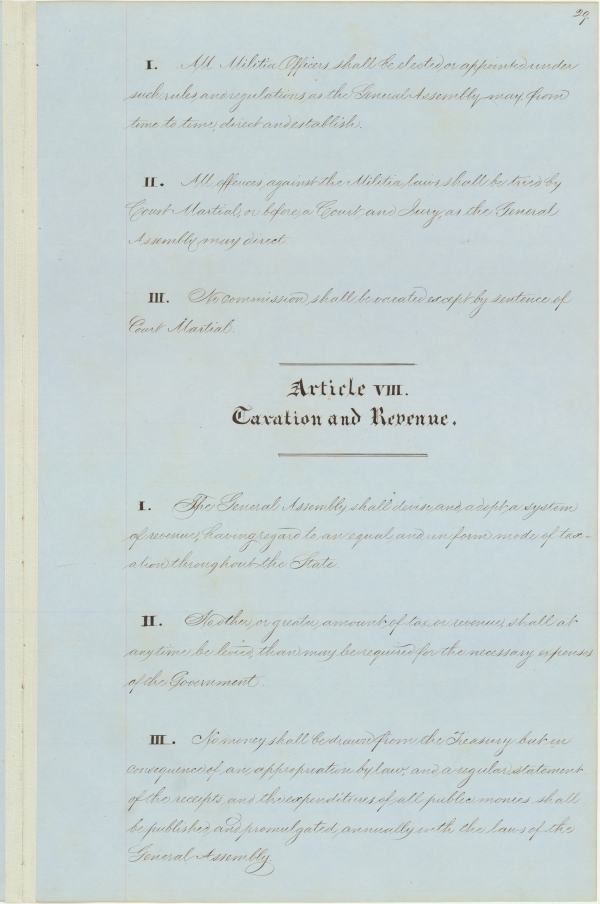
 Listen: The Folk Program
Listen: The Folk Program